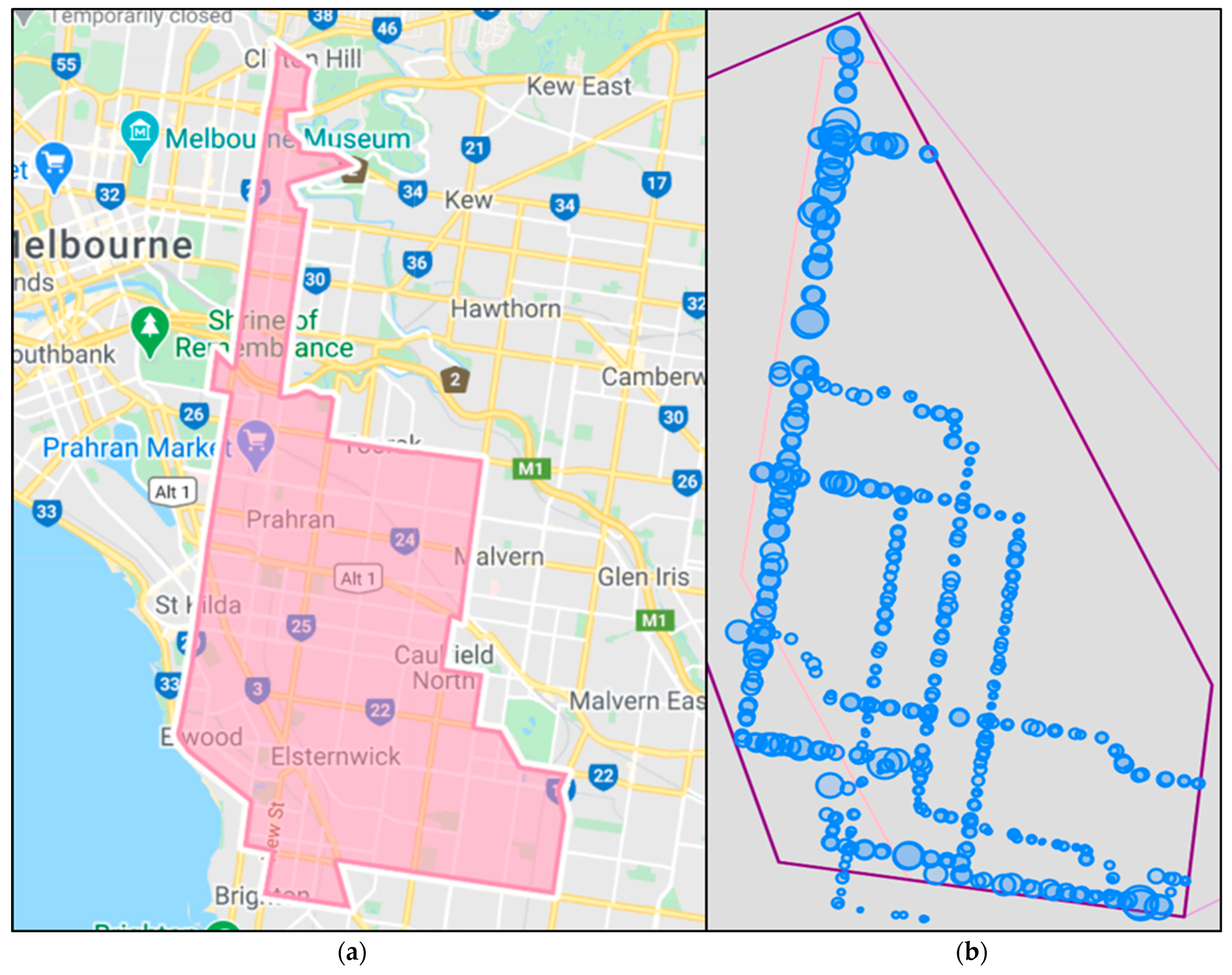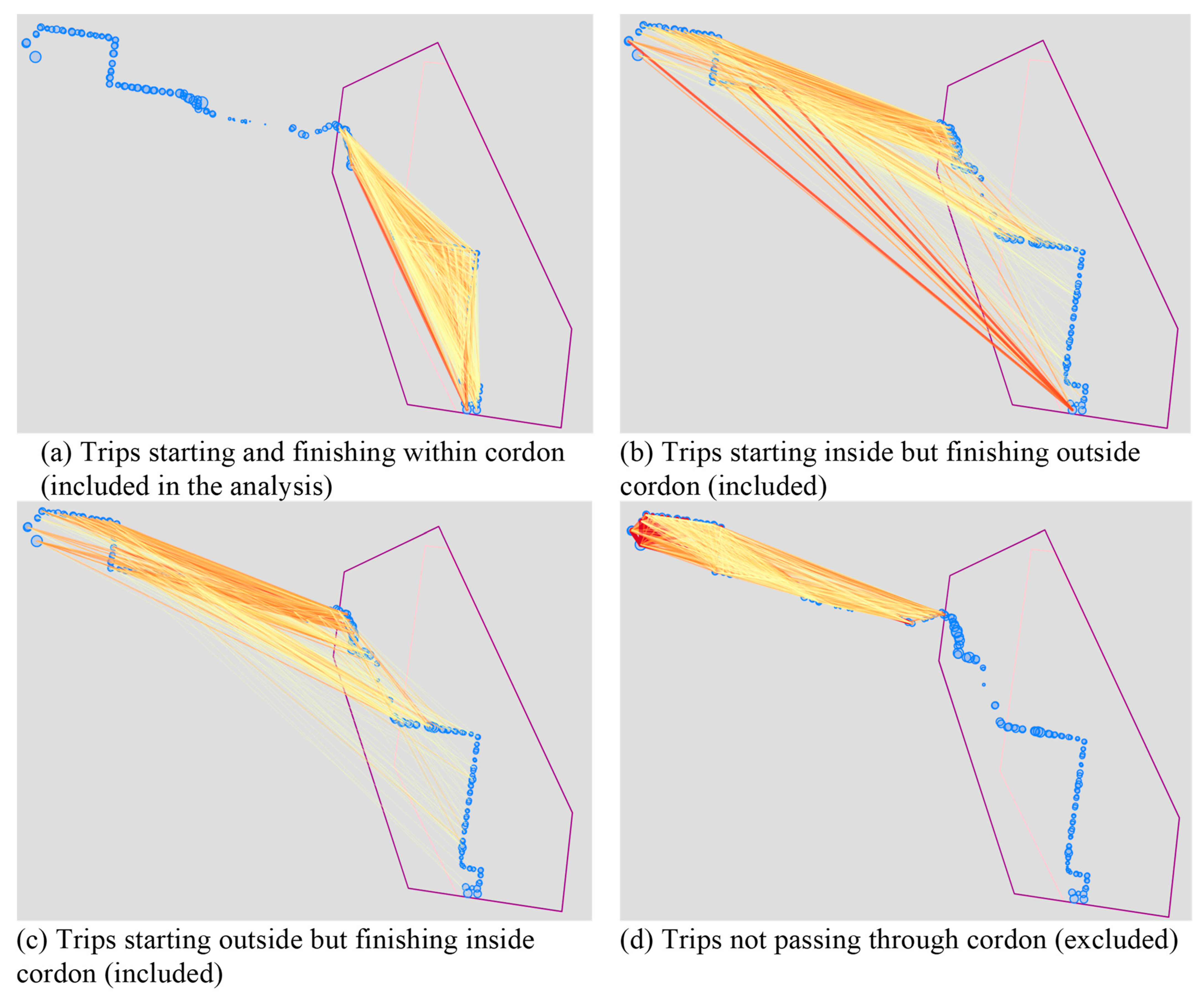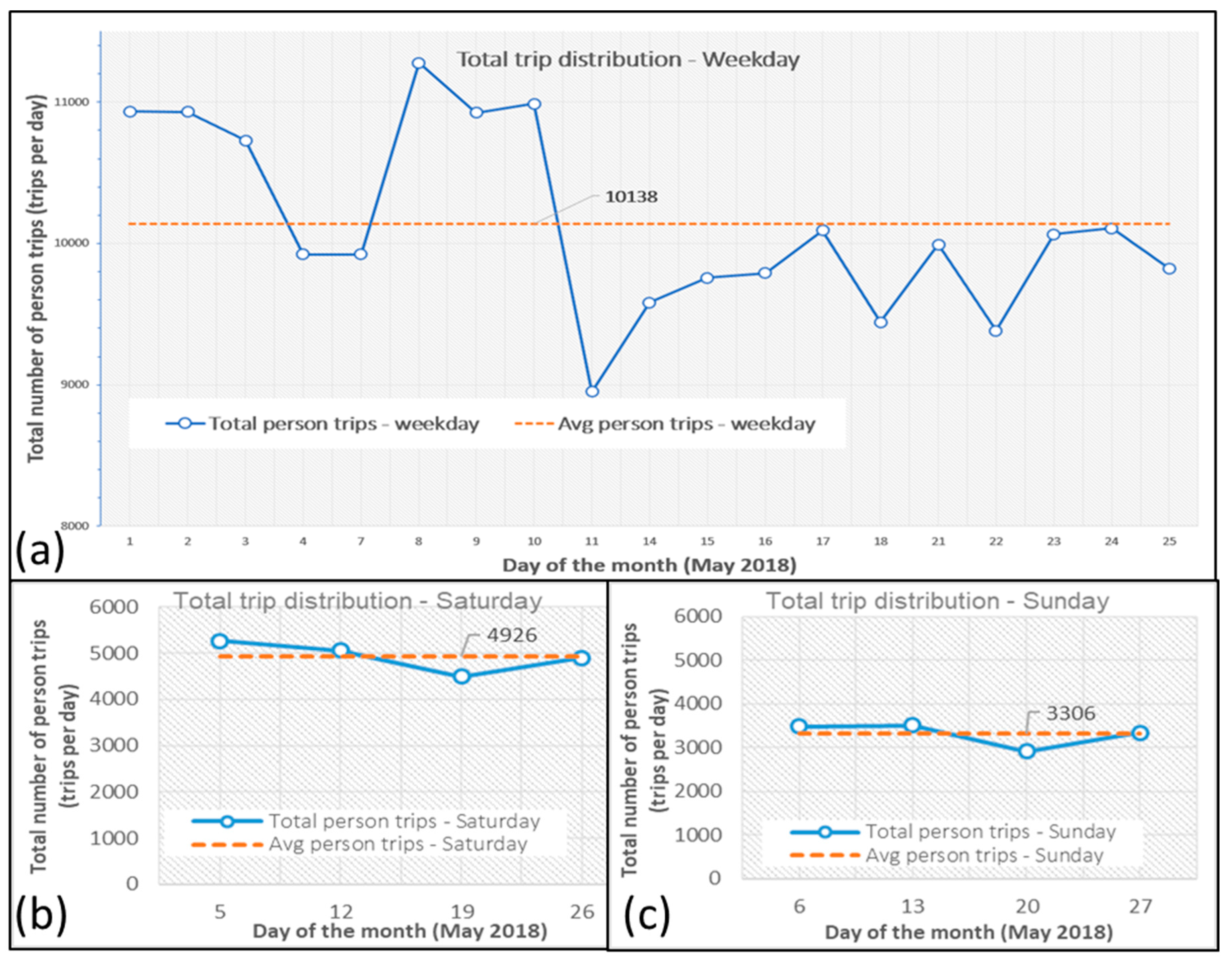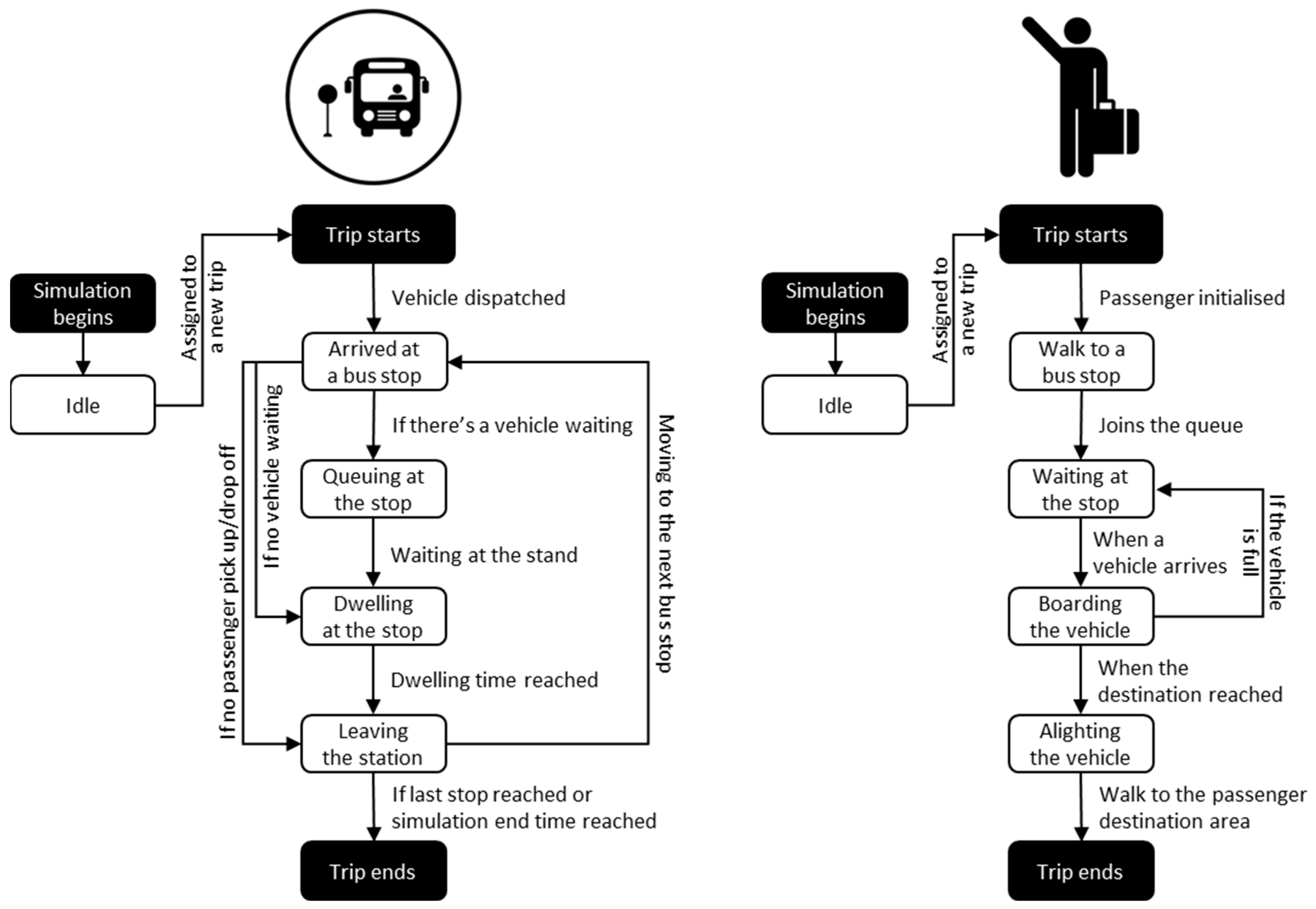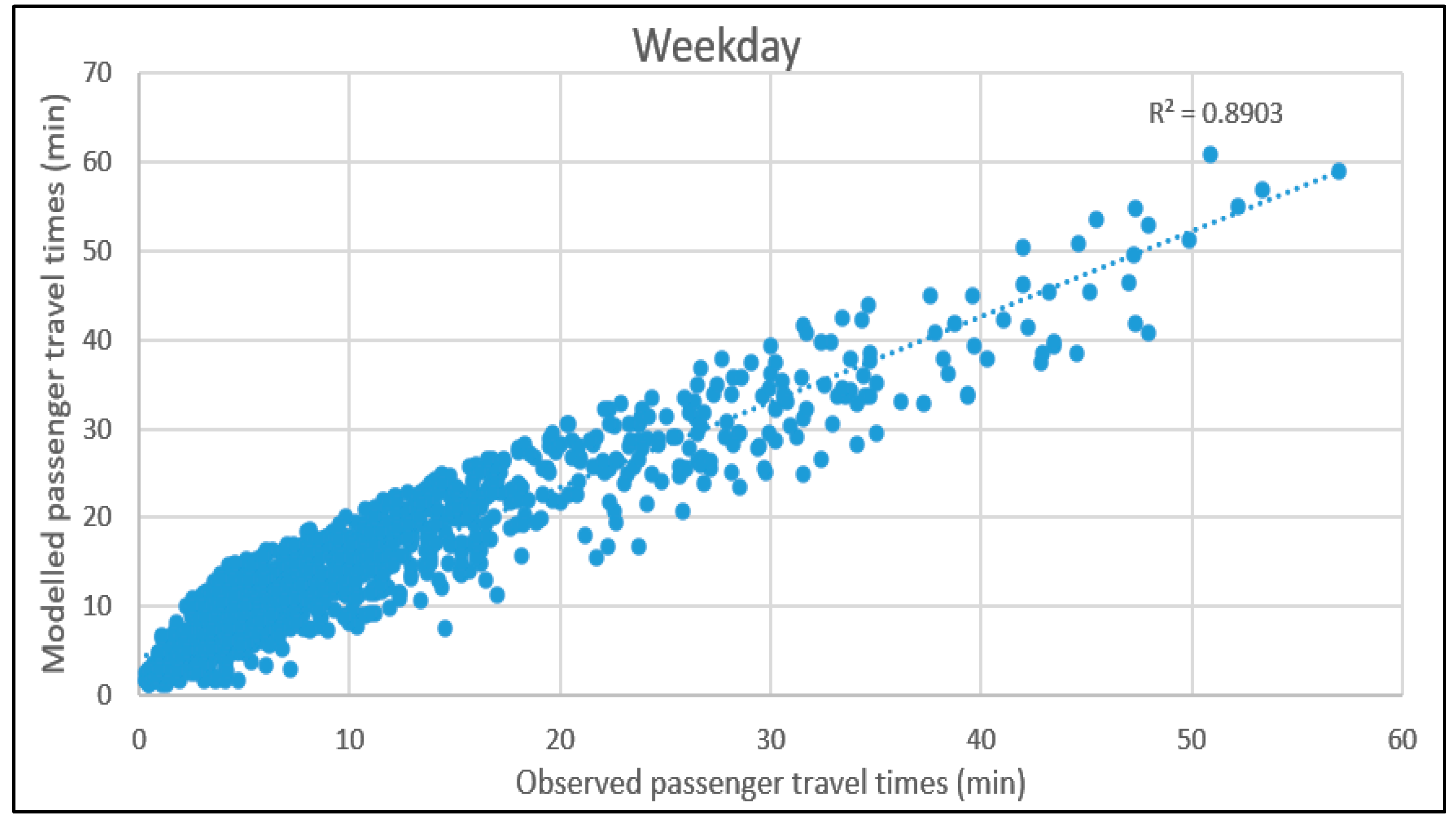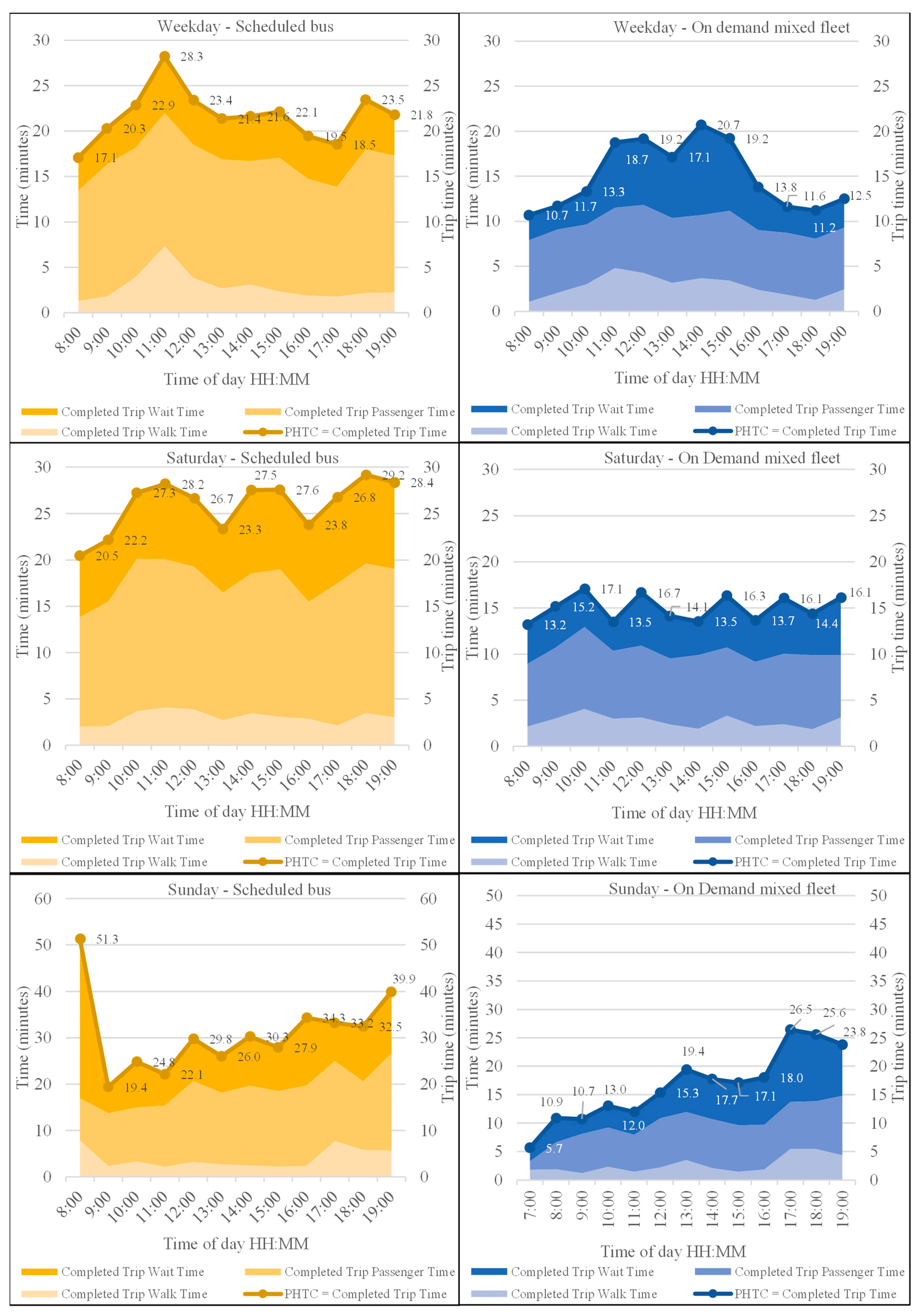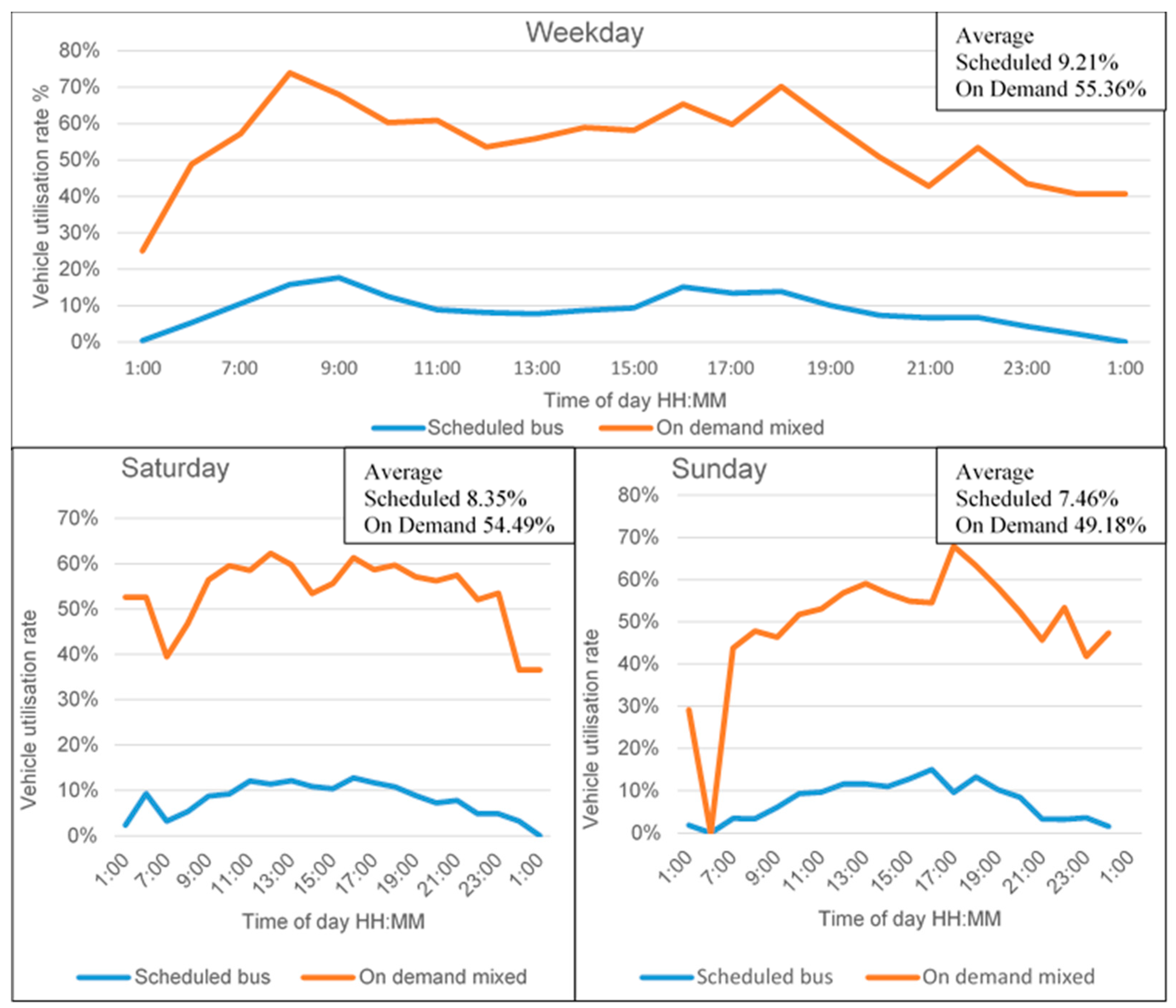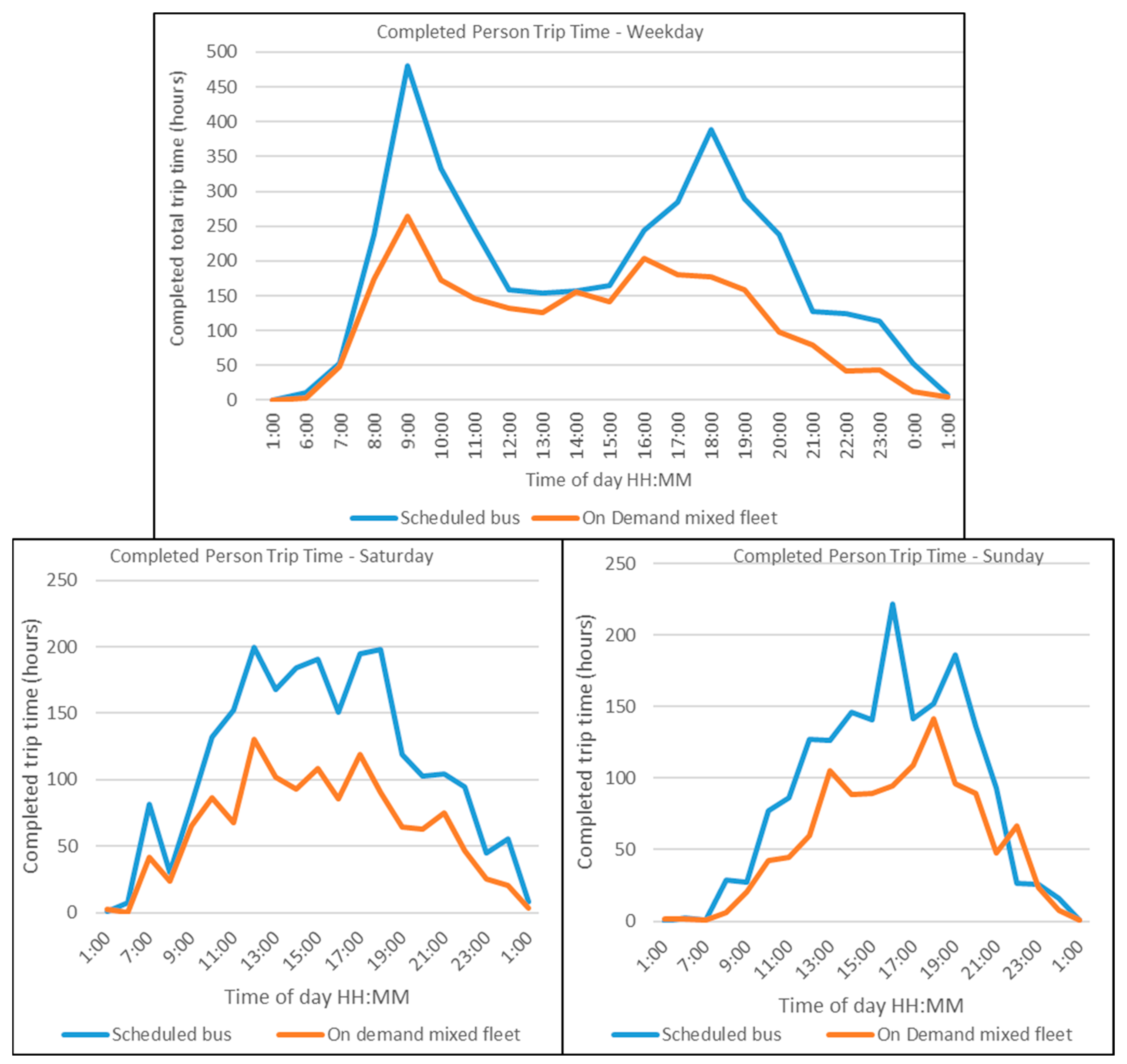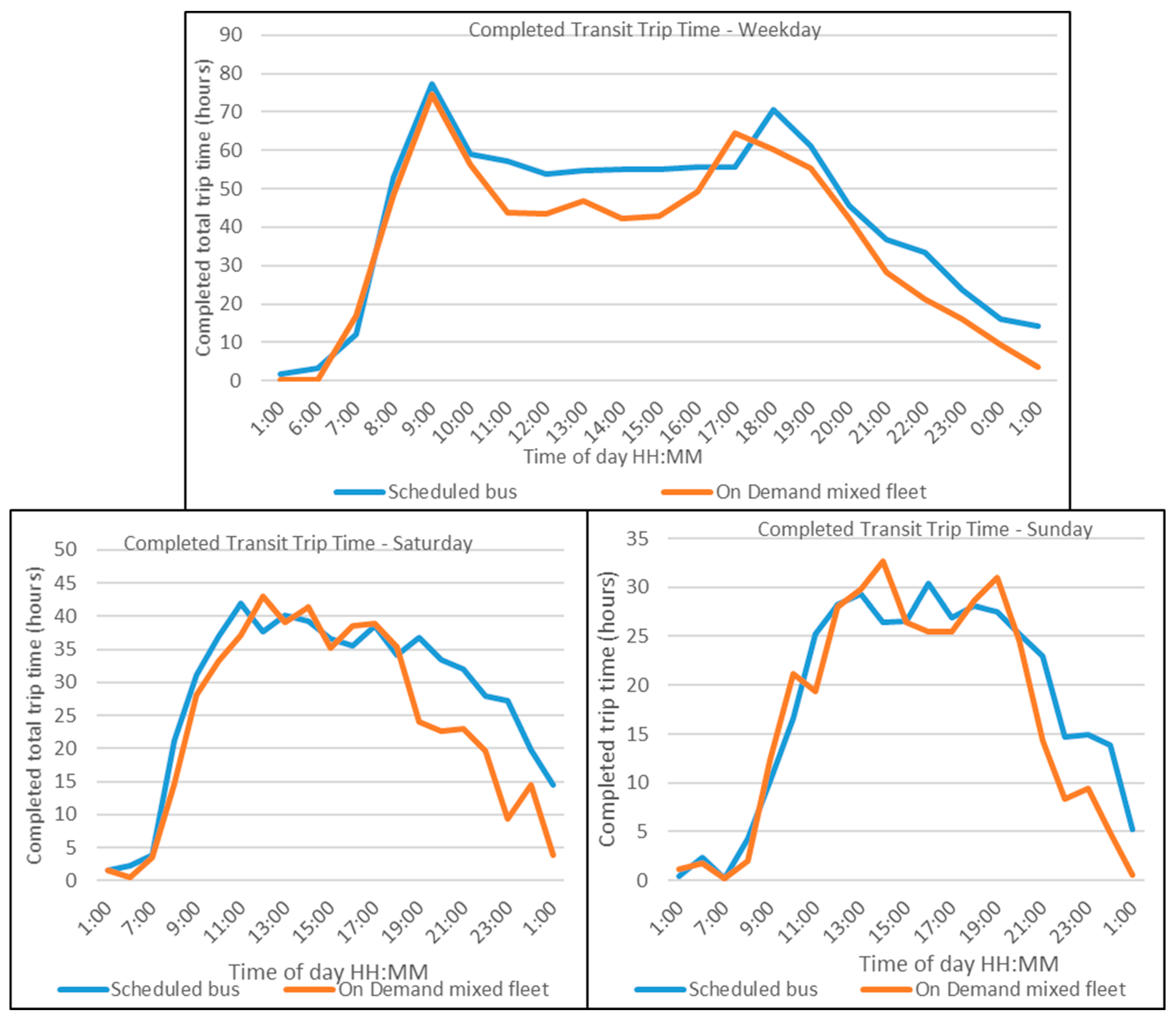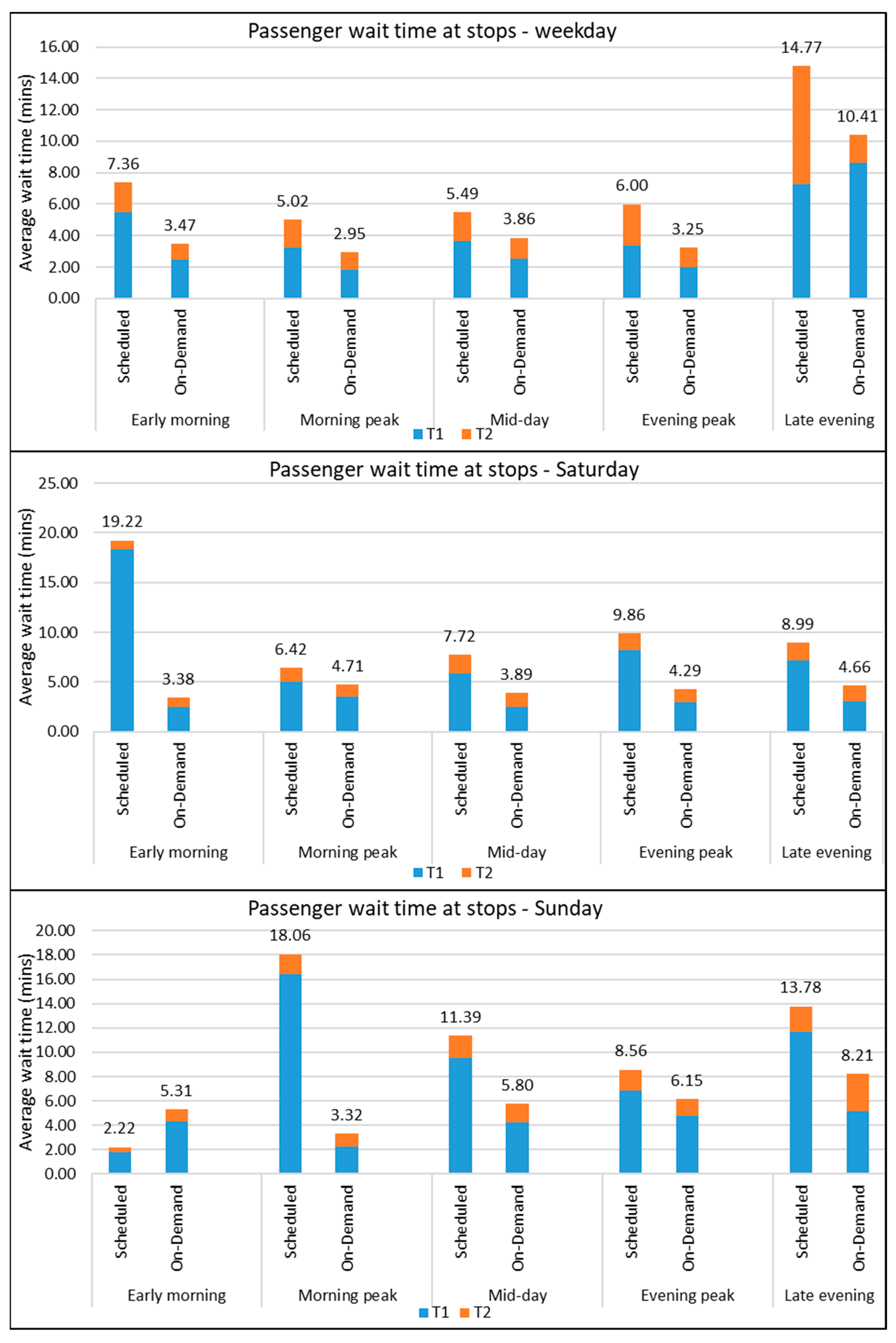Abstract
This paper uses smart card data from Melbourne’s public transport network to model and evaluate the impacts of a flexible on-demand transport system. On-demand transport is an emerging mode of urban passenger transport that relies on meeting passenger demand for travel using dynamic and flexible scheduling using shared vehicles. Initially, a simulation model was developed to replicate existing fixed-schedule bus performance and was then extended to incorporate on-demand transport services within the same network. The simulation results were used to undertake a comparative analysis which included reliability, service quality, operational efficiency, network-wide effectiveness, and environmental impacts. The results showed that on-demand buses reduced average passenger trip time by 30%, increased vehicle occupancy rates from 8% to over 50%, and reduced emissions per passenger by over 70% on an average weekday compared to fixed-schedule buses. This study also offers insights for successful on-demand transport implementation, promoting urban sustainability. It also outlines future research directions, particularly the need for accurate short-term passenger demand prediction to improve service provision and passenger experience.
1. Introduction
Advancements in technologies and operational business models enabled by digital platforms and mobile applications are creating new opportunities to develop alternative mobility solutions to complement existing public transport systems [1]. The motivation for this type of service has been inspired by the poor performance of existing bus services, particularly outside of peak hours, and the desire to provide a better user experience for consumers who are digitally connected and increasingly demanding improved service performance.
Over the past half-century, a variety of policies that focused on private vehicles, without paying equal attention to public transport and other low-carbon mobility solutions, have dominated the urban transport landscape and resulted in unsustainable transport and urban mobility practices that promoted more vehicle travel, resulting in more congestion and emissions [2]. For a long period of time, privately owned vehicles were promoted as offering a high degree of flexibility and convenience for urban travelers, especially independence and ease of movement, and remained a prominent mode of choice for urban travelers in many cities around the world [3]. In comparison, public transport services, especially buses, were not given equal priority in policy and planning strategies and did not receive similar political and financial support, which resulted in lower investments and less reliable services, which discouraged passenger uptake even though they were less costly compared to owning a private car [2,4,5,6].
However, while this trend has been seen in many countries, specifically those with historically low public transport patronage, in many European cities, such as London, Paris, and Berlin, substantial political and financial support for public transport systems, especially buses, has been present since the 1970s. These cities implemented policies such as dedicated bus lanes, intermodal interchanges, and bus priority traffic regulations, which significantly improved the reliability and attractiveness of public transport [7]. For example, London’s Red Routes and the London Bus Priority Network helped improve bus travel times, reducing congestion and making public transport a more viable alternative to private vehicles [8].
In other regions, such as Singapore and Curitiba, Brazil, public transport systems were similarly prioritized, with innovations such as Singapore’s fare integration [9] and Curitiba’s Bus Rapid Transit (BRT) [10] system becoming global models of efficiency and reliability. Moreover, in New York, the Select Bus Service (SBS) has introduced bus lanes and priority signals to improve the efficiency of bus services, contributing to increased public transport patronage [11]. These global examples demonstrate that public transport can be a sustainable and attractive option when properly supported by policy and investment. They offer valuable lessons for cities such as Melbourne, now exploring more flexible, on-demand transport systems to optimize public transport performance.
The rapid pace of technological and digital advancements and innovations provides new opportunities for urban mobility solutions that can overcome these challenges. These digital solutions have also started to pave the way for middle-ground alternatives that improve passengers’ public transport experience without the heavy costs associated with owning and running a private vehicle or using a taxi or ride-sharing service [12].
One particular solution that has attracted the attention of decision-makers in recent years is on-demand public transport. This solution, which has been promoted over the past few years as an alternative to private vehicles and a complement to high-performance public transport, provides services that are more suited to lower-density areas, off-peak periods, public holidays, and weekends. These services also meet the requirements of travelers with specific needs, including senior citizens and travelers with disabilities [13,14,15]. This emerging mode of urban transport is known by a variety of names such as on-demand public transport, flexible mobility-on-demand [12], mobility-on-demand [16], flexible transportation systems [17], and Demand Responsive Transport (DRT) services [18,19,20,21]. These services operate small- and medium-sized vehicle fleets to serve specific travel demands [18,19,21,22] or as part of Mobility-as-a-Service provisions [23]. They can be considered a cost-effective and efficient alternative to improve access and convenience and reduce travel costs for travelers without the need to own a vehicle [24]. Rather than relying on traditional public transport vehicles that follow pre-defined schedules and fixed-route services, this approach offers a flexible, more convenient, and demand-responsive service that uses shared vehicles that run on demand. Technological developments and app-based solutions improve the quality and responsiveness of these services through real-time reservations, service vehicle location tracking, and lower costs when compared to owning and operating a private vehicle [1,12]. Such services are also ideal for providing personalized transportation solutions with nearly seamless trip chains that fill the gap in urban transportation systems for the first-to-last kilometers of travel.
This paper explores the opportunities presented by on-demand transportation services, leveraging smart card data from Melbourne’s public transport network. The motivation behind such services stems from the shortcomings of existing bus services, particularly during off-peak hours, and the growing demand for enhanced user experiences in the digital era. This study explores on-demand bus services, combining flexibility with predefined routes based on real-world demand. Using the Commuter simulation tool, predetermined conditions are set to systematically analyze scenarios, fleet sizes, and operational configurations. Routing algorithms, employing heuristic and optimization techniques, efficiently allocate passengers, with dynamic adjustments responding to events such as pick-ups, drop-offs, and real-time traffic conditions. This approach ensures adaptability, allowing for a comprehensive evaluation of the system’s performance under varying conditions.
This study addresses the contemporary on-demand passenger transport management issue, focusing on optimizing flexible trip services within Melbourne’s transport network. This research utilizes real data from Melbourne’s passenger transport system, ensuring the findings are relevant and applicable to real-world scenarios. The choice of micro traffic simulation as the methodological approach is particularly well-suited for this study, providing detailed insights into traffic dynamics and service performance. The simulation allows for an accurate assessment of various scenarios, enhancing the reliability of the results and supporting effective decision-making for on-demand transport solutions. By employing this methodology, the study offers valuable contributions to the field of transport management and serves as a model for similar analyses in other urban contexts.
This study shows that integrating on-demand transport with fixed-route services enhances efficiency and sustainability, particularly in low-density areas and off-peak times. On-demand services complement fixed routes without significant differences in trip completion rates or journey times. This integration improves service quality, reduces emissions, and offers a flexible option for passengers, supporting sustainable urban transport development.
2. Related Literature
Previously, the idea of offering door-to-door services has been experimented with in various urban areas across the globe, yielding varying levels of accomplishment [6,25]. Such DRT and similar transit service planning and designs have been addressed in the literature since the early 2000s. The literature comprises different desktop approaches to conduct a comparative evaluation of the performance of demand-responsive transport solutions. These desktop approaches were selected mainly due to a lack of extensive field data to evaluate their in-field performance. Generally, three desktop approaches are used to compare on-demand public transport with conventional transport modes.
Among the three approaches, the first method employs qualitative techniques such as stated preference surveys to assess user preferences and acceptance of these services [26,27]. These studies analyze factors impacting users’ mode choice preferences and service demand, observing how preferences evolve in urban and suburban contexts globally. This approach reveals who is willing to use on-demand transit and the trade-offs they are willing to make, such as cost, walking distances, wait times, and service reliability, influencing their shift from regular modes. This information helps operators plan operational costs, resource needs, and facilities (e.g., park and ride) in the long term. The authors of [28] conducted a stated-preference experiment on travel trade-offs, highlighting reduced attractiveness for transits with delays and uncertain seat availability [28,29]. Another study [30] used a Revealed Preference-Stated Preference survey to evaluate potential mode shifts to DRT, identifying influential attributes (cost, travel, and waiting times), with a 44% potential transit switch to DRT from buses [30].
The second approach employs analytical models to gauge performance and assess social inclusion and accessibility criteria for strategic planning [31]. In a study in 2004 [32], a dial-a-ride problem was tackled analytically, introducing the “regret insertion heuristic” algorithm for accommodating numerous user requests with narrow time windows. This approach outperformed classical heuristics with high-quality time windows, assuming door-to-door service, yet shareable trips with walkable transit stops were not considered. In 2007, an insertion heuristic merged flexible DRT with low-cost fixed-route service for dense-demand areas was introduced [33]. This model lacked practical user–system negotiation. In 2009, a continuous approximation approach analyzed user-related feeder bus performance and identified critical demand densities for service-type switching [34]. A gravity-based extension evaluated transit connectivity impacts [35]. Analytical methods address fleet sizing, service quality [36], transit routing design [37,38], and flexible strategies [39]. They reveal user and operator costs that change with demand, operating area [40], and fleet size [41]. While analytical models offer optimal solutions across countless alternatives, they simplify reality through assumptions and approximations [42].
On the other hand, the traffic simulation approach is optimal for capturing and simulating the intricacies of transport networks [43]. Agent-based modeling, an effective method [44], is widely used for tactical decisions in transport services with first- and last-mile connections [12,45,46]. A study [47] employed agent-based modeling for automated vehicles’ first-come, first-serve connection for train trips that utilized dispatching algorithms to accommodate travel requests on a first-come, first-serve basis for individual (non-shared) trips. Another study [48] balanced user quality and system efficiency using modular simulations with different flexibility levels. Another framework assessed automated DRT’s impact on mass transit [49], finding that high-capacity vehicles reduced congestion. Some studies found limited acceptance when users had to walk short distances [50]. However, they lacked integration and public transit comparisons. A comparative analysis highlighted DRT shared services’ convenience in specific demand patterns for low-demand areas in fast-growing cities compared to taxis [51,52,53].
As has been shown in the Related Literature Section, the simulation approach provides a realistic representation of performance under specifically designed scenarios. In this research, the simulation approach is used to provide a simulation-based assessment of the performance of different scenarios based on a real-world dataset of passenger demands for an inner-city part of Melbourne. Then, we evaluated how they perform compared to existing scheduled bus services using a validated real-world public transport smart card dataset comprising trip origins and destinations within the study area.
The motivation for this work is that, to date, several on-demand public transport services have been trialed in cities worldwide with varying degrees of success. This research aims to understand their operational performance and identify success factors or pitfalls to avoid when implementing these services.
One prominent example is the Keoride service operated by Keolis Downer in the Northern Beaches of Sydney, Australia. The trial, initiated in 2017, was designed to supplement traditional public transport with an on-demand service. It was carried out in collaboration with GoGet, a car-sharing business offering a range of bookable vehicle options through the Keoride app. Since its launch, Keoride has facilitated over 400,000 journeys within the first three years, and as of recent reports, it handles more than 19,000 monthly trips. Key factors contributing to the success of Keoride include the adaptability of its services to customer demands, a diverse vehicle fleet, and partnerships between public and private entities to leverage their combined expertise [54,55,56,57]. In 2019, the service was further optimized using advanced software and fleet arrangements to meet growing demand.
Other examples of successful on-demand public transport trials include:
- ArrivaClick operates in the UK, in cities such as Leicester, Liverpool, and Sittingbourne. ArrivaClick launched in 2017, and the service provides an alternative to fixed-route buses by offering demand-responsive mini-bus rides with an average of 4583 monthly users [58].
- Brengflex, launched in December 2016 in the Netherlands, serves an average of 16,500 passengers per month with its on-demand transport service, allowing users to request rides in real-time within some geographic regions [59].
- Résa’Est, introduced in 2018 in France, operates with 2077 passengers per month, offering door-to-door services in areas with less frequent scheduled public transport [60].
- Shotl, a demand-responsive service that started in 2017 in Les Planes, a suburb of Barcelona, Spain, has since expanded to multiple cities and transported approximately 300,000 passengers during its operation [60].
Despite these successes, various trials have been discontinued due to operational challenges. For instance, Kutsuplus in Finland (2012–2015), BRIDJ in the USA (2014–2017), Beeline in Singapore (2015–2020), and Chariot in the USA and London (2014–2019) were shut down for reasons including difficulties in scaling, achieving viable user densities, high operating costs, network-specific challenges, and insufficient demand during off-peak hours. These closures emphasize the complexity of implementing on-demand services and highlight the need for careful consideration of factors such as fleet optimization, route planning, user awareness, and service hours to ensure viability [61,62,63,64,65,66].
Understanding both the successes and challenges of these trials provides valuable lessons for developing effective commercial operations for on-demand public transport, which remains the focus of this research.
In recent years, the widespread use of public transport smart card data has offered new opportunities to evaluate and improve the performance and reliability of public transport systems [67,68,69]. This study evaluates the issues impacting on-demand public transport performance by employing agent-based traffic simulation models to understand the conditions necessary for successfully deploying these services and their impacts and benefits compared to existing scheduled bus services. Specifically, the Commuter traffic simulation tool developed a case study using real-world smart card passenger demand data. The model was calibrated and validated before running and evaluating different scenarios, providing full-day operational analyses for both weekdays and weekends.
This paper’s structure is as follows: Section 3 outlines the methodological framework, covering the study area, data needs, agent-based methodology, and extensions for on-demand service modeling. Section 4 and Section 5 present the modeling framework, including assumptions and test scenarios. Section 6 analyzes and interprets results, comparing model performances for existing public buses, fleets, and on-demand hybrid fleet buses versus fixed-route services. Section 7 summarizes the challenges in implementing on-demand transportation. Lastly, Section 8 concludes and provides insights for future research directions.
3. Methodology
In this study, a microscopic traffic simulation approach models both current fixed-schedule bus services and proposed on-demand buses within a Melbourne case study. Multiple scenarios were formulated to assess performance and conduct comparative evaluations based on predefined key performance measures and criteria. The traffic simulation’s major advantage lies in generating numerous test scenarios that are replicable and analyzable. The traffic simulation model used, Commuter, employs advanced algorithms to model individual travelers and their behaviors [70,71,72]. As described later, the model was calibrated using actual passenger touch-on/off data and bus schedules.
The methodology for this study integrates several components, including transport modeling, to comprehensively assess on-demand transport services. It includes micro traffic simulation for detailed transport dynamics and extends to evaluating service reliability, quality of service, operational efficiency, network-wide efficiency, and environmental impact. Reliability is assessed through scenario testing, quality of service is measured by average trip and waiting times, and operational efficiency is analyzed via vehicle utilization rates and cost metrics. Network-wide efficiency is evaluated through trip completion rates and total travel distances, while environmental impact is calculated based on emissions for different service scenarios. The economic analysis also involves a detailed assessment of operational costs and average costs per person, including distance, time, and stop costs. This approach ensures that the methodology aligns with the diverse results and provides a holistic view of the on-demand transport system.
3.1. Study Area
Melbourne, comprising over 5 million residents, is Australia’s largest urban population center [73]. The selected study area (Figure 1) focuses on several inner suburbs in Melbourne’s southeastern region, including vital bottleneck routes within some of the city’s most congested corridors. These corridors play a significant role in Melbourne’s urban mobility, heavily relying on road-based public transport, mainly buses. Furthermore, the selected case study zone enjoys well-developed access to various forms of public transportation, including conventional buses equipped with MyKi smart card readers.
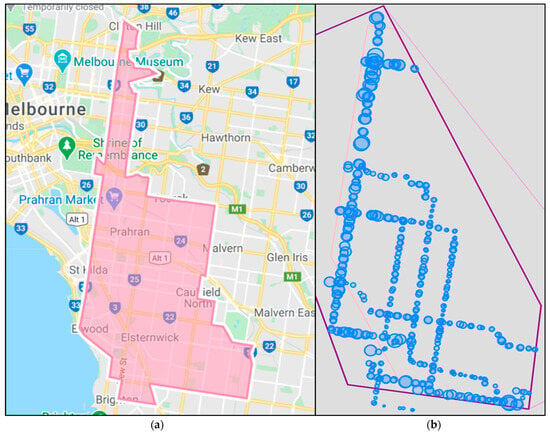
Figure 1.
(a) Selected study area in southeast Melbourne (b) Bus stop locations within the study cordon area. Source: Authors. Produced using Java version 8 in the Eclipse integrated development platform.
The emphasis on bus services in this study is essential, given that buses form a fundamental component of Melbourne’s public transport network. Figure 1 illustrates the locations of existing bus stops, with the size of each circle indicating the total volume of trips originating from and ending at each location. Unlike Melbourne’s inner metropolitan area, where mobility patterns are heavily influenced by rail and metro systems, Melbourne’s public transport system, especially in its southeastern region, depends significantly on bus services to cater to the travel demands of its population.
The study area in Melbourne’s southeastern suburbs is characterized by high traffic congestion and reliance on private vehicles. Conventional bus services face long wait times and overcrowding, impacting their reliability. Public transport usage in this region is low compared to private car use, with public transport (mainly buses) serving only about 14% of daily trips. Private vehicles serve 53% [74]. This makes this region an ideal candidate for on-demand bus services that offer more flexibility and better meet commuter needs.
The MyKi smart card system is widely used in Melbourne, with over 1 million daily Myki touch-ons [75]. It enables seamless fare payment across various transport modes, including buses, and provides valuable data on travel patterns, which would inform the implementation of the new on-demand service.
3.2. Data Collection
To address the absence of authentic origin–destination (O–D) field data covering on-demand operations, this study employed existing demand data from public bus transportation as a baseline. The approach assumed that bus stops served as both trip origins and destinations. To prevent potential data clustering in time and space due to a flexible scheme, identical clustered demand was used for both fixed and on-demand scenarios, ensuring a direct comparison based on identical demand data. The Department of Transport (DoT) undertook comprehensive measures to refine the smart card data and mitigate limitations. This encompassed the elimination of invalid trips, exclusion of school buses from the analysis, and supplementation of smart card touch-on data with survey data to account for passengers who might not have tapped on due to various reasons. The dataset used in this study contained the fields presented in Table 1.

Table 1.
Description of data fields in the MyKi dataset.
The dataset provided insights into bus transportation patterns within the study area. Despite data limitations, utilizing existing smart card data offered potential benefits and challenges of on-demand services. Future research could improve accuracy by using real origins, destinations, and travel times if available. The study used MyKi smart card data [76], recording passenger touch-on and touch-off events. It spanned May 2018 and supplemented touch-on info with survey data to estimate bus patronage. Approximately 10% to 14% of transactions lacked route identification. Around 60% of passengers tapped upon entry, and fewer tapped off. Data were anonymized, invalid trips were removed, and school buses were excluded.
3.3. Data Description
The smart card data facilitated a more comprehensive comprehension of prevailing bus passenger demand characteristics, ultimately contributing to the development of simulation models that are not only more pragmatic but also highly credible. The dataset included details for all bus routes, covering 18 service routes in both directions, as specified in Table 2. The dataset included all trips where at least one end of the journey (either start or finish) occurred within the study area. Trips that solely passed through the study area without making stops were excluded from consideration. Figure 2 provides visual examples of relevant trips for bus route 220. By applying these inclusion and exclusion criteria, a total of 225,548 viable trips within the period of 1–27 May 2018 were utilized for this study. This dataset served as the foundation for constructing the simulation model, covering an expanse of 35.3 square kilometers. The model incorporated 462 bus stops and 18 bus routes, constituting 36 round trips traversing the study region.

Table 2.
Summary of trips in the study area.
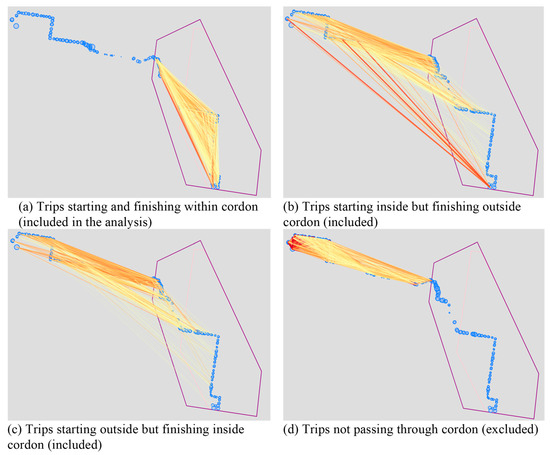
Figure 2.
Trip inclusions and exclusions for bus route 220.
Please refer to the Supplementary Materials for a visual representation and a detailed overview of the spatial and temporal patterns of passenger demand between bus stops in the MyKi data, which facilitates a more thorough understanding of the input data used for the simulation.
3.4. Overview of Total Trip Distribution
The operational schedules for the current bus services within the study zone (for the equivalent timeframe of MyKi data collection) were extracted from the travel information portal of Public Transport Victoria [76]. These timetables encompass distinct arrangements for weekdays (Monday to Friday), Saturdays, and Sundays. The daily count of bus passenger trips, as deduced from the MyKi data, is visually depicted in Figure 3.
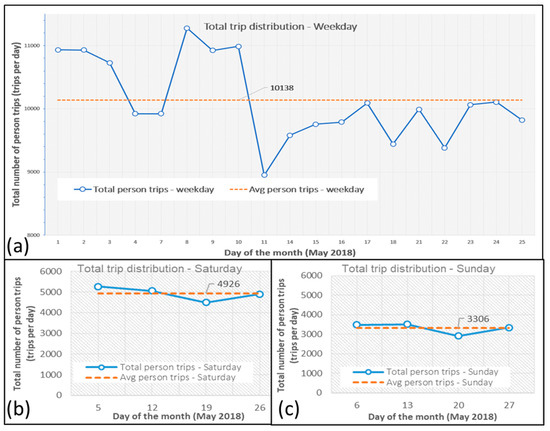
Figure 3.
(a) Weekday, (b) Saturday, and (c) Sunday bus passenger trip distribution (person trips per day).
4. Modeling Framework
This section describes the traffic simulation modeling framework and the model extensions developed to evaluate demand-responsive public transport services within the simulation environment.
The base traffic simulation platform utilized in our study is the ‘Commuter’ software by Azalient, which later on was acquired and commercialized by Autodesk and became integrated into the Autodesk Cloud-based traffic simulation tools. However, the authors continued to use the Azalient ‘Commuter” software version because it included higher levels of functionality than the cloud-based version (such as the Java module).
4.1. Agent-Based Modeling Environment
The traffic simulation modeling environment used in this study, Commuter, simulates travelers and vehicles as agents representing drivers, cyclists, walkers, or passengers on trains, trams, or buses throughout their journeys between origins and desired destinations. Commuter tracks each agent and generates traveler and public and private vehicle information over the simulation duration. The software is capable of modeling each person’s trip using single agents that are modeled walking from their origins, arriving at a bus stop, waiting, traveling, reaching the final stop, and walking to their destination. Travelers in Commuter select the least expensive route in a dynamic fashion. The routing algorithm in Commuter calculates the lowest cost route to the destination for each agent (person or vehicle) being modeled. The behavioral aspects of each agent can be specified, including cost values for time, distance, and price preferences. The routing algorithm combines these into a single value for the total cost to the destination. When “feedback routing” is enabled, these costs are re-calculated at intervals to reflect network travel times and congestion levels. For vehicle traffic, this means that if a road that was part of the lowest-cost route becomes congested (travel time increases), a subsequent cost calculation will recognize the higher cost for that road and switch the traveler to a lower-cost route instead. For each person’s trip, dynamic cost calculations include the time to wait for a bus and the time to travel on that bus. The waiting time is based on the time of arrival of the next bus after a passenger has arrived at the bus stop. When a list of bus departure times is specified, travelers simulated in the model are boarded on the next arriving bus. At the end of the simulation, information is gathered from the model about network performance measures, including travel times, speeds, and the number of passengers transported by each bus service, as well as passenger waiting times, delays, the duration of trips, bus utilization rates, and other statistics.
Traffic simulation methodologies have been researched over the past few decades and are well-established and documented in a large number of previous studies, including [43,77]. The reader is referred to these articles for more information about their technical details and underlying theoretical frameworks. For the completeness of this paper, some of the key elements of simulation are presented next.
Agent-based traffic simulations track the trajectory of individual vehicles in a detailed road network. Each driver/vehicle unit (DVU) is assigned a set of physical (e.g., vehicle dimension and performance) and behavioral properties (e.g., driver aggression, awareness, and reaction time), which determine the motion of the vehicle and driver behavior. Traffic simulations are based on different theories of microscopic traffic behavior such as car-following, lane-changing, gap acceptance, and driver behavior.
4.2. Car Following
Car-following behavior has a significant impact on the accuracy of the simulation model in replicating traffic behavior on the road. Car following considers the situation of one vehicle following another in a single lane. In general, the trailing vehicle will respond to observed stimulus from the leading driver according to this relationship:
Response = λ Stimulus
The stimulus comprises factors such as speed, relative speed, inter-vehicle spacing, accelerations, and vehicle performance and driver behavior parameters. A proportionality factor (λ) equates the stimulus function to the driver response. This relationship forms the basic philosophy behind the car-following theories. Other critical parameters that govern car-following models include mean headway and mean reaction time. These parameters are assigned random values for each individual vehicle according to a pre-defined distribution function.
4.3. Lane Changing
An understanding of the lane-changing process is also necessary to allow an accurate representation of traffic flow behavior in multi-lane situations. Three main categories of lane-changing models are reported in the literature: (1) the safety-based model considers the extent to which the rear vehicle in the target lane is willing to decelerate to allow the lane-changing maneuver to occur. (2) The scoring and threshold model assesses the stimulus to lane changing based on a range of scaling factors. (3) The action point model represents the human perception of speeds and distances in the lane-changing process. Perceptions are compared to threshold values to determine whether drivers can achieve a lane change.
4.4. Gap Acceptance and Driver Behaviour
In conflicting situations, drivers must find acceptable or ‘safe’ gaps in which to merge with or cross the major traffic flow. Important parameters are the critical gap and follow-up headway for minor roads and the distribution of the car following the headway on major routes. Some gap acceptance models include variability in the acceptable gap and have provisions for modeling drivers’ tolerance thresholds as they wait for an acceptable gap. Additional driver behavior parameters, such as aggression and awareness, are included in some models, and usually, these are assigned randomly to individual DVUs according to a statistical distribution.
The behavior of bus/DRT users is defined through a number of parameters that control their behavioral decisions. Behaviors are assigned to person types, and each person generated in the model has one of the defined types.
Each person in the model has behavioral parameters such as ‘can drive’, ‘can ride in a public transport vehicle’, and ‘can walk’. The user cost types are (walking costs, public transport costs, and drive costs) as follows:
- Walking cost (time component): The value of time for walking, specified in small currency units (cents) per second.
- Walking cost (distance component): The value of distance for walking, specified in small currency units (cents) per unit distance (km).
- Walking cost (base): A base walk cost is used to account for bias in short trips against long ones.
- Riding cost (time component): The value of travel time on public transport, specified in small currency units (cents) per second.
- Riding cost (distance component): The value of distance for traveling on public transport, specified in small currency units (cents) per unit distance (km).
- Riding cost (base): A base public transport cost used, for example, to model the base payable fare.
- Waiting cost (time component): The value of time for waiting on public transport, specified in small currency units (cents) per second.
- Driving cost (time component): The value of time for traveling in a private vehicle (car). The cost value is specified in small currency units (cents) per second.
- Driving cost (distance component): The value of distance for traveling in a private vehicle, specified in small currency units (cents) per unit distance (km).
- Driving cost (base): A private vehicle cost is used, for example, to model the base cost of vehicle ownership.
The behavioral parameters are also applied when modeling a multi-stage journey. For example, if a journey is made up of a car trip from home to the train station parking lot, followed by a pedestrian trip from the parking lot to the train platform and a public transport trip on the train from the origin to the destination station, all three trips can be modeled using an agent with consistent behavior.
Traffic simulation methodologies are also now widely accepted as rigorous models that can be used to evaluate the impacts of Intelligent Transport Systems applications, low-carbon mobility solutions, and technology-driven transport interventions and solutions. The reader is referred to the following articles, which provide more details on potential and relevant use cases and applications [78,79,80].
In this work, the performances of the fixed-schedule and on-demand buses based on the same travel demand data were compared. Therefore, the frequency of the demand-responsive service is determined based on the same passenger demands used for fixed-schedule buses. The routes, as well as the boarding and alighting locations of demand-responsive vehicles, are assumed to be the same as the existing bus transport services. This is done this way only for the purposes of this paper, which is to perform a comparative analysis between existing and proposed services based on the same travel demand data. In the future, when such an on-demand service is available, the demand will be determined through the on-demand bus app (similar to Uber), where the traveler books or requests a vehicle to be picked up from a pre-defined set of locations determined by the service operator.
In this study, an agent-based microscopic traffic simulation approach was employed using the “Commuter” simulation platform to model both existing fixed-schedule bus services and the proposed on-demand public transport within a case study in Melbourne. Our methodology involves the development of various scenarios aimed at evaluating performance and conducting comparative assessments based on pre-defined key performance measures and criteria.
The process of creating public transport services within the simulation tool used in this study includes specification of the following attributes:
- Public Transport Stands: These are the bus stops where passengers can board or alight. Stands serve as mode change locations and decision points in the route choice network.
- Trails: These are the defined sequences of roads used to create routes for public transport services.
- Services: These are the routes taken by public transport vehicles, such as buses, trams, or trains, including the stops at stands.
- Timetables: These specify departure times for each public transport trip.
Each stand and transport type has parameters to consider, such as size, number of doors serviced, and vehicle characteristics. The model allows for the creation of multiple services more efficiently by defining common route sequences and reusing them. Public transport demand is modeled separately, and different transport types can be specified with varying parameters for size, movement, and display.
In our agent-based traffic simulation tool (Commuter), the process of managing skipped bus stops due to lack of demand, particularly in on-demand bus operations, involves several key steps. Initially, all bus routes, the location of all stops, and timing information are defined, outlining the public transport routes that on-demand buses take and the locations of stops along these routes. Then, the demands of vehicles and people are modeled, incorporating commuter patterns, passenger distribution, bus arrival frequencies at each stop, and which fleet type and size to be dispatched at certain times. Utilizing the conditional option included within these tools, custom behaviors are produced to determine whether a bus should skip a stop based on current demand levels. This dynamic decision-making process evaluates conditions throughout the simulation, considering factors such as passenger arrivals, traffic congestion, and alternative transportation options. Following simulation runs, the results are analyzed to assess the impact of skipped stops on transport parameters such as travel time and network performance, helping in the optimization of fleet sizes, bus routes, and schedules for real-world transportation networks.
The scheduled and on-demand bus simulator modules are designed to represent the experience of passengers using public bus transportation, including regular services as well as bridging services during service disruptions. The Commuter traffic simulator simulates buses, bus stops, and passengers. Buses traverse the network, transporting passengers between stops. This network represents consecutive stops along bus routes. Scheduled buses have a fixed capacity, and on-demand buses have a varying capacity limit for passengers ranging between four, seven, and 12 passengers per vehicle fleet. The commuter software tool incorporates thresholds based on fleet capacities—either four, seven, or 12 for on-demand options and 43 for scheduled buses—ensuring that buses do not exceed their maximum passenger limits.
The main active agents are the on-demand buses/scheduled buses and passengers, and their state and transition from entering the network to leaving the network are presented in Figure 4.
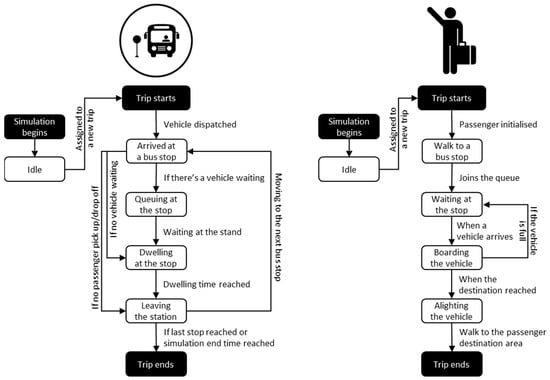
Figure 4.
Bus and passenger agents in the simulation model within the network from start to end.
The “Commuter” simulation platform was chosen for its ability to generate a large number of testing scenarios efficiently, allowing for easy replication and in-depth analysis. This platform utilizes advanced algorithms to model individual travelers, capturing their unique characteristics and behaviors [70,71,72]. To tailor the simulation to the specific objectives of this research, authors have developed plugins—software modules dynamically loaded at run-time. These plugins extend the capabilities of the traffic simulation package and communicate with it through an application programming interface (API).
4.5. Externally Developed Plugin
An external plugin was developed in Java to expand the existing capabilities of the simulation tool, including provisions for irregular bus departure intervals and variations of on-demand shared vehicle capacity, such as a variety of fleet sizes to meet passenger demands. This was required in order to enable the modeling of on-demand services and realistically simulate the behavior of shared on-demand transport. The code, which can be used with any Commuter model, requires the bus trip table to represent the times and types (size and capacity) of on-demand buses that will be released.
The routing algorithm in Commuter automatically finds the lowest-cost route to the destination. For each agent (person or vehicle) within the simulation, the Commuter calculates the lowest-cost route to the destination. The behavior window specifies cost values for time, distance, and price, and the routing algorithm combines these into a single value for the total cost to the destination. If “feedback routing” is enabled, these costs are re-calculated at intervals. For vehicle traffic, this means that if a road that was part of the lowest-cost route becomes congested, so that the time to travel that road increases, a subsequent cost calculation will “see” a higher cost for that road, and the lowest-cost route may use another road instead.
For each person’s trip, this dynamic cost calculation includes the time to wait for a bus and the time to travel on that bus. The waiting time is based on the time of arrival of the next bus at each stand to which a person may walk.
Therefore, when specifying the list of bus departure times, the people simulated in the model will board the bus that is most convenient for them. Post-simulation, the tool gathers information about which bus was used by each person and outputs this as the set of modeled person–bus assignments.
5. Model Development and Testing Scenarios
This section details model development and the scenarios that have been developed and tested in this study.
5.1. Verification, Calibration, and Validation
For model development and testing, passenger travel times were chosen as a key performance measure to determine passenger demands’ spatial and temporal distributions over the simulation period within the study area. This study is constrained by the software’s capability to primarily output mean values for service-related indicators, limiting the presentation to this format. However, mean values offer valuable insights into the learning of the indicators, facilitating a general understanding of simulated scenarios. It should also be noted that a number of replications are completed for each scenario to ensure that the randomness of traffic and behavioral conditions present in everyday traffic are built into the simulation results. Therefore, the values presented are not for a single random run but rather account for the variability of demand conditions by considering five simulation runs per scenario.
The existing fixed-schedule bus services were considered as the base case scenario. Because demand-responsive bus services are not deployed in Melbourne yet, they could not be calibrated or validated in the model because field data do not exist. This study’s initial travel demand matrix was based on smart card data (touch-on and touch-off). The regular bus services followed a number of pre-determined timetables (one timetable is used for Monday to Friday, and then different timetables are used for Saturdays and Sundays). Three models were calibrated and validated for each of the timetables, and the results were compared. The accuracy of the models was validated using an R-squared test [81] to quantify the differences between observed and simulated values (in this case, passenger travel times).
Model validation demonstrated close alignment between simulated and actual trip times from smart card data (Figure 5). The model accurately replicated passenger travel times, with 89% correspondence to observed field data on average weekdays and weekends.
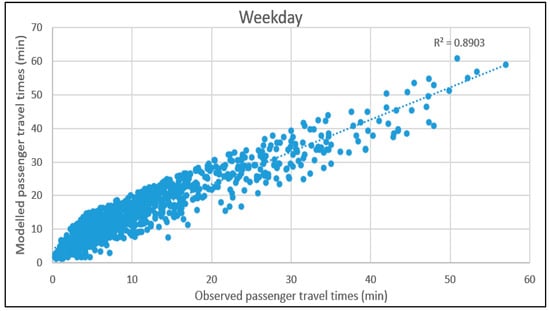
Figure 5.
Modeled versus observed passenger travel times for average weekdays.
5.2. Testing Scenarios and Assumptions
A number of fixed and on-demand public transport services were modeled and compared to demonstrate the impacts of on-demand buses. All trips were simulated between 5:00 AM and 1:00 AM the next day. Background traffic is used with a single-occupant car trip matrix comprising 12,859 vehicle trips based on VISTA travel survey data [82]. The baseline scenario represented existing conditions where trips are accommodated with scheduled bus services on fixed routes that are operated according to timetables [76]. The bus fleet comprised diesel vehicles with a capacity of 43 passengers.
The on-demand simulation settings ranged from “rigid”, where the service operated almost like scheduled bus services, to “flexible”, where they operated almost like an on-demand taxi. The performance indicators used included service quality, passenger experience, operator service efficiency, system efficiency (including trip completion rate, passenger trip time, bus trip time, and passenger and bus trip distances), environmental emissions, and on-time performance (bus stop waiting times). Commuter was adapted to include demand-responsive features using an external plugin that allowed for the evaluation of how the base demand for bus trips can be met using a fleet of on-demand buses. In addition to the base scenario, the following on-demand scenarios were included.
5.2.1. On-Demand Scenario 1: Pre-Configured Route and Partly Fixed Timetable
In this case, the on-demand service partially mimics existing bus services that run on fixed schedules. A detailed list of possible bus routes is determined in advance. The timetable is partially fixed, and the stops are pre-defined and are only used on request. Different fleet sizes were tested. Scenario 1 is sub-divided into three categories (Scenario 1.1, 1.2, and 1.3) with different transport mode types, which included (1) a car with a capacity of four passengers (diesel under 2000 cc); (2) a multi-purpose vehicle MPV with a capacity of seven passengers (diesel over 2000 cc); and (3) a van with a capacity of 12 passengers (diesel). The bus trip table changed according to demand and fleet size in each scenario. For example, in Scenario 1.1, there were 10,108 passenger trips during an average weekday that were accommodated using 2658 vehicle trips, each with a capacity of four passengers per vehicle.
Similarly, there were 1603 vehicle trips for Scenario 1.2 with vehicles with a capacity for seven passengers. Finally, 1003 trips were accommodated using 12-passenger vehicles. For a fair comparison, all scenarios included the same passenger demand and background vehicle traffic.
5.2.2. On-Demand Scenario 2: Deviations from Pre-Defined Routes
In this case, pre-defined routes that operate the on-demand services are established in advance. Fleet sizes and timetables varied according to demand. That meant more frequent services in peak periods on highly utilized pre-defined bus routes. Three types of service vehicles are used, which include (1) vehicles with four seats (diesel under 2000 cc), (2) seven seats (diesel over 2000 cc), and (3) 12 seats (diesel). These three types represented a car, MPV, and van, similar to the vehicle types used for Scenarios 1.1, 1.2, and 1.3. When passenger demand is high during peak periods and the pre-defined routes are congested, vans with 12-seat capacity are used. During off-peak periods, four-seater vehicles were used. For example, on average weekdays, the 10,108-passenger trip-demand matrix was accommodated using 2201 vehicle trips that included 1318 car-type vehicles, 578 MPV-type vehicles, and 305 van-type vehicles. The maximum allowed waiting time for any passenger was 5 min. The same passenger demand and background vehicle trip matrices used in Scenario 1 were also used in this scenario to provide a common baseline for comparison.
In summary, in both scenarios, flexibility is a key feature, primarily centered around route adjustments based on demand. Scenario 1 adopts pre-configured routes with a partly fixed timetable, while Scenario 2 integrates deviations to pre-defined routes, optimizing service based on observed demand patterns. Moreover, both scenarios incorporate capacity flexibility, allowing the system to deploy different vehicle types based on observed demand.
To ensure a fair comparison of supply or operating costs, tests were conducted under the same demand for different scenarios. Specifically, Scenarios 1.1, 1.2, and 1.3 utilized fleet sizes of four-seater, seven-seater, and 12-seater vehicles, respectively. This deliberate fleet variation under identical demand conditions provides valuable insights into how fleet size influences the economic aspects of on-demand bus services. Such comparisons are instrumental in understanding the nuanced impact of fleet configuration on the efficiency and cost-effectiveness of the service.
6. Results
The following key performance indicators were generated at the end of each simulation experiment and used in the analysis of results:
- Person summary: aggregated time, distance, and other details for every person trip in the model;
- Vehicle summary: Aggregated time, distance, and other details for every private vehicle trip. In this study, the same vehicle trip table is used as background traffic to allow for a consistent comparative evaluation;
- Transport summary: Aggregated time, distance, and other details for every transport vehicle trip, including bus fleets;
- Transport details: Information on individual transport service trips, as well as comprehensive information per stand and passenger.
One of the key objectives for running on-demand services is to minimize operational costs and distances traveled by vehicles and improve service quality (expressed by the average passenger waiting time and average onboard passenger time). Therefore, the comparative evaluations were analyzed considering the following criteria:
- Service quality and passenger experience expressed in terms of average passenger trip time for completed trips;
- Service efficiency (from a commercial operations standpoint) expressed as vehicle utilization rates (passengers per hour);
- Public benefit in terms of system efficiency, indicated by passenger and vehicle trip completion rates, total kilometers traveled, and overall travel times and distances for all completed trips;
- Environmental emissions (CO2, NO, and PM10) for every completed trip;
- On-time performance is measured as average passenger waiting times at stops.
In order to ensure a comprehensive analysis, vehicle kilometers (veh-km) and vehicle hours (veh-hours) were included in the analysis to assess operational efficiency. The economic analysis covers the cost per kilometer in the distance cost, time cost including cost per hour and driver cost, and stops cost including cost per stop. These metrics help evaluate the operational and economic aspects of both service types.
The Results Section comprises three parts. Part 1 is for analysis of the baseline scenario. This section replicates the performance of the existing bus service (number of vehicles, number of passengers boarding and alighting, and passenger load per service hour). The second part focuses on comparing fleet size for partially fixed services. In this part, three fleet sizes (four, seven, and 12) were considered, and scenarios were developed with the same demand as in Part 1. The objective was to establish how well each fleet size can accommodate the same demand used for scheduled bus services. This fleet performance comparison is analyzed in terms of individual user experience, individual service vehicles, and overall transport service. Then, the main analysis is conducted between on-demand services (with varying fleet sizes with respect to the demand) and scheduled bus services. This analysis compares service quality, passenger experience, operator service efficiency, system efficiency (including trip completion rate, passenger trip time, bus trip time, and passenger and bus trip distances), environmental emissions, and on-time performance (bus stop waiting times).
6.1. Results for Baseline Scenario (Scheduled Bus Services)
The model was first used to replicate existing scheduled bus services as a baseline for the comparisons. Key performance indicators were then generated to evaluate their performance, as shown in Table 3. Each simulation experiment was run for a period of 27 h (including warm-up and cool-down periods) from midnight to 03:00 AM the next day. A summary of bus service performance on the 18 bus routes (36 round trips) that traversed the study area is provided in Table 3 (refer to Table 3).

Table 3.
Summary statistics for existing bus transport services.
In Table 3, the “number of vehicles” refers to the “total number of vehicles on each route” during the service period (5:00 AM to 1:00 AM the next day). Boarding and alighting refer to the total number of passengers boarding/alighting for all vehicles on each service route. Finally, the distance-averaged load represents bus occupancy divided by capacity for each vehicle, expressed as total passenger distance (kilometers) divided by total trip distance. This measure represents the service vehicle utilization along the service route.
According to Table 3, a total of 1704 bus trips served 10,807 passenger trips on an average weekday; 1007 bus trips served 5252 passenger trips on an average Saturday; and 696 bus trips served 3663 passenger trips on an average Sunday. The distance-averaged load results show that each service operated with low vehicle utilization rates (less than 20%, including weekdays). In these situations, on-demand services can help accommodate bus demands during low-demand periods or less attractive service routes.
Another set of results is provided in Table 4. This presents passenger boarding per service hour for existing routes on an average weekday. There were no bus services from 1:00 AM to 5:00 AM; therefore, hourly information during this period is excluded from the analysis. The cells highlighted in red depict the number of boarding sessions per hour, which is less than 20. It has been suggested in the literature that routes with less than 20 boarding sessions per hour are considered “underperforming” [83]. According to these criteria, routes 220, 246, and 630, as well as peak periods for routes 605, 623, 200, and 207, performed well, but the rest of the routes underperformed.

Table 4.
Passenger boarding per service hour for existing bus services on weekdays.
6.2. Fleet Size Comparisons for Partially Fixed Services
Performance measures for different fleet sizes (four, seven, and 12 vehicles) for partially fixed services were also analyzed (Table 5). As outlined before, the smart card data were used to establish a set of one-hour origin–destination matrices that contained hourly passenger counts from origins to destinations. A partially fixed service timetable is created for these on-demand bus services where the real-world bus stops were considered origins and destinations.

Table 5.
Performance measures for different fleet sizes and partially fixed services.
The first section of Table 5 summarizes the person–trip statistics, including aggregated time, distance, and other information for all person trips. For each weekday scenario, as well as experiments on Saturday and Sunday, person–trip completion rates were above 93%. This means most travelers reached their destinations within the modeling duration, which is a good indicator of the system’s throughput and its ability to deliver passengers to their destinations within a short period of time. Person-kilometers traveled for completed person trips and person-hours traveled for completed person trips are comparatively higher in weekday scenarios compared to weekend scenarios, which indicates, as expected, that people made longer trips during weekdays on their regular commute trips. Emissions indicators were also used, and the results showed that CO2, NO, and PM10 emissions per person were lower during the weekend than on weekdays. This was also expected due to the long commutes, which would result in higher emissions.
The results in Table 5 highlight that vehicles with a fleet size of 12 would increase trip completion rates slightly compared to vehicles with a fleet size of four for both weekday and weekend traffic. Increasing fleet size also resulted in reducing the completed trip emissions per person, including CO2 (kg), NO (g), and PM10 (g). However, completed trip distances and completed trip times increased for the fleet comprising 12 vehicles compared to the fleet that comprised four vehicles.
The second section of Table 5 presents public transport vehicle statistics that show aggregated information for public transport service vehicle trips. In this case, over 96% of the buses in every scenario reached the last bus stop of the service routes before the end of the simulation. When the fleet size (capacity of each service vehicle) increases, the required number of service vehicles is reduced because the passenger demand is constant over all the scenarios. In addition, completed trip distances and times, which are the sums of all incremental movements of distance and time by all vehicles that have reached the last bus stop, were evaluated. The total completed trip distances and times were found to reduce with increased fleet sizes. Completed trips with CO2 (kg), NO (g), and PM10 (g) per person were also reduced with the increased fleet size.
The third section of the table shows statistics on public transport services for each passenger trip. The average wait time is calculated by adding the average time between reaching the stop and the arrival of the next bus (minutes). The average time spent waiting at the stop after the arrival of the first vehicle is calculated as the average passenger’s unexpected wait time at stops (minutes). This “unexpected wait time” is non-zero if the vehicle is late or it arrives fully loaded, and the passenger has to wait for the following vehicle. Among these three scenarios, Scenario 1.3, which used service vehicles of fleet size 12, had the lowest number of services, which is expected because when the fleet size is larger (e.g., 12-seat vehicle capacity), then a smaller number of vehicles are needed to meet the same passenger travel needs. The service timetable can be spread out at larger intervals. This, however, comes with reduced customer convenience in terms of waiting times, as shown in Table 5, where waiting time, both expected and unexpected, is higher for scenario 1.3, which operates a fleet of 12 vehicles. Finally, Table 5 compares the maximum passenger load rates (i.e., the maximum number of passengers on vehicles divided by vehicle capacity), which is a measure that needs to be maximized to improve cost-efficiency. However, this rate was lower in scenario 1.3 (12-passenger vehicles) than in scenario 1.1 (four-passenger vehicles). This demonstrates that when the vehicle size is larger, the average passenger’s expected and unexpected wait time is high, and vehicle utilization is low, resulting in less efficient operations. As expected, when the service is less frequent, passenger experience becomes poor (although it is more profitable for the service operators). Therefore, finding the balance between passenger experience and operators’ and public benefits needs to be considered when operating such public services.
6.3. Comparative Evaluations
This section provides a comparative evaluation between conventional scheduled bus services (baseline scenario) and on-demand public transport based on the same passenger demands from the real-world MyKi smart card data (Scenario 2). The evaluation will be based on a number of pre-determined criteria, which will be discussed next. As outlined before, the on-demand services were catered for using fleet sizes that accommodate four, seven, and 12 passengers dispatched according to the established demand under the constraint of a maximum wait time of 5 min for each passenger.
6.3.1. Service Quality and Passenger Experience
The service quality and passenger experience are evaluated in terms of the completed average passenger trip times.
The “completed average passenger trip time” represents the average travel time for completed trips, encompassing walking, in-vehicle travel, traffic delays, and waiting at bus stops. In contrast to presently scheduled buses, Figure 6 highlights the substantial advantages of demand-responsive services in terms of passenger travel times, including in-vehicle, waiting, and walking times.
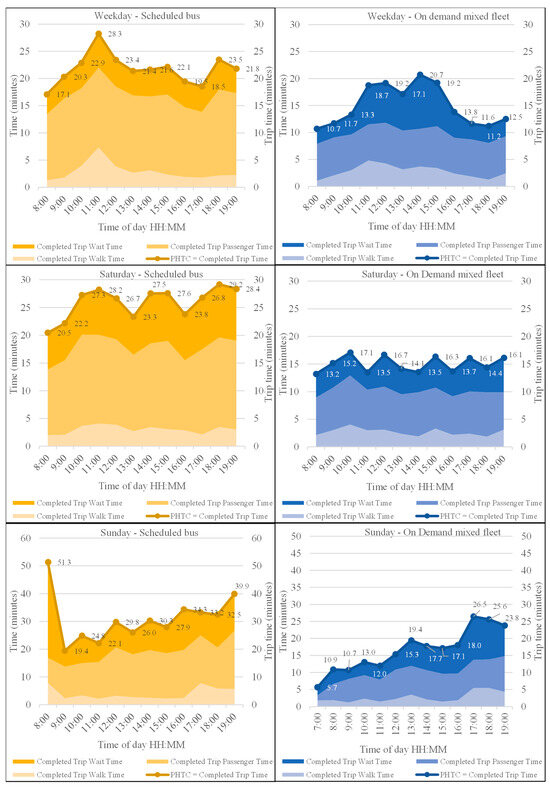
Figure 6.
Completed average passenger trip time.
On weekdays, the completed passenger trip time for scheduled buses was 22 min, contrasting with 15 min for on-demand services, marking a 30% reduction. During off-peak times, on-demand averaged 11 min, whereas scheduled buses took 23 min, signifying a 52% reduction in trip times. On an average Saturday, the completed average passenger trip time for scheduled bus service was 26 min compared to 15 min for on-demand service, representing a 42% reduction for demand-responsive services. Similarly, the off-peak periods on Saturdays experienced a reduction of 51% for demand-responsive services. These results show that demand-responsive services can significantly reduce total passenger trip time, which is a collective result of reductions in trip passenger time and trip wait time (trip walk times are the same for both scenarios).
6.3.2. Service Efficiency (Operator’s Perspective)
From the operators’ perspective, delivering services with well-utilized vehicle fleets is essential for cost-effective commercial operations. This is evaluated regarding vehicle occupancy, representing the maximum load of passengers carried in each vehicle every hour.
Vehicle occupancy or maximum passenger load with respect to vehicle capacity (Figure 7) shows that on-demand services can improve vehicle occupancy significantly compared to scheduled fixed fleet services, even during off-periods and weekends. Specifically, average vehicle utilization was found to be around 7–8% for weekdays and weekends for scheduled bus services. On-demand services simulated to meet the same demand resulted in more than 50% vehicle utilization for weekdays and weekends. During peak periods on weekdays, vehicle utilization rates for on-demand services climbed up to around 74%. The findings demonstrated the advantages of mixed-fleet on-demand services for operators as well.
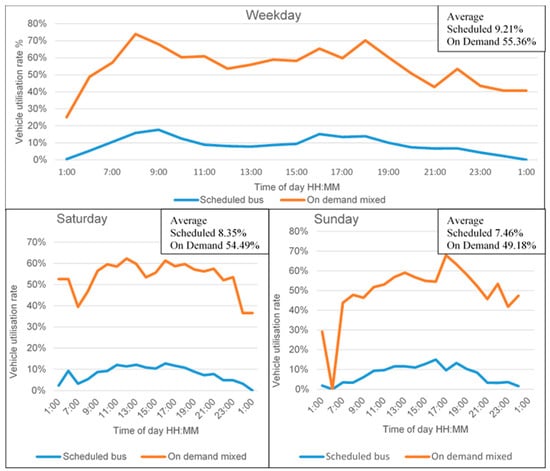
Figure 7.
Hourly vehicle utilization rate.
6.3.3. System Efficiency (Public Benefit)
This section presents performance indicators capturing network-wide impacts and efficiencies (Table 6). The measures considered explain how well each transport mode performed on trip completions, vehicle kilometers traveled, and trip times and passenger kilometers traveled.
- Trip completion rate
The percentage of completed passenger journeys during the simulation time is known as the trip completion rate. It is a metric that shows whether all bus passengers reached their destinations and completed their journeys. Person trip completion rates and bus trip completion rates for baseline and on-demand scenarios were over 98%. This meant that all modeled scenarios could transport passengers to their destinations, and all the bus trips reached the last stop on their routes before the simulation ended.

Table 6.
Trip completion rates.
Table 6.
Trip completion rates.
| Trip Completion Rate % | Weekday | Saturday | Sunday | |||
|---|---|---|---|---|---|---|
| Fixed Schedule | Demand-Responsive | Fixed Schedule | Demand-Responsive | Fixed Schedule | Demand-Responsive | |
| Passenger trips | 99.6% | 99.1% | 99.9% | 99.7% | 99.8% | 98.5% |
| Public transport vehicle trips | 97.5% | 98.0% | 100.0% | 99.9% | 100.0% | 99.7% |
- 2.
- Completed person trip time
The total travel time (hours) for all travelers who finished their journeys is known as completed person trip time or total person-minutes traveled. The results indicate that on-demand services offer a significant advantage over scheduled buses on weekdays and weekends (Figure 8). The results indicate that demand-responsive services have the potential to deliver the same demand for travel while at the same time reducing the total passenger trip times in peak and off-peak times. During the peak period on an average weekday, the scenario that uses on-demand mixed fleets to accommodate the demand manages to reduce the passenger trip time by more than 50%.
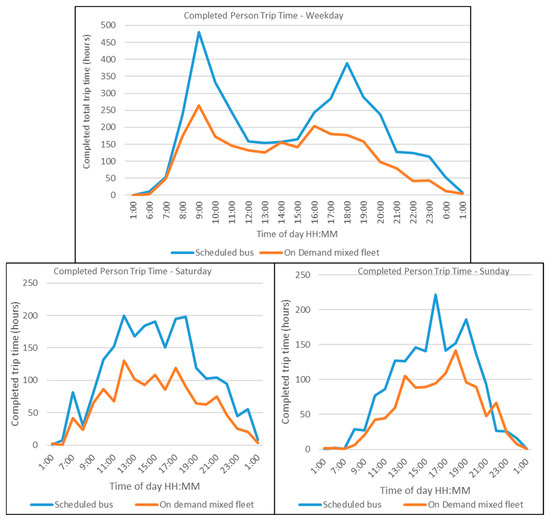
Figure 8.
Completed passenger trip time.
Similarly, the on-demand mixed fleet scenario significantly reduced passenger trip times during the weekend compared to the scheduled bus scenario. The drastic reduction in passenger trip times in on-demand scenarios is mainly attributed to the reduction in passenger wait times at stops.
- 3.
- Completed trip bus time
Completed trip bus time sums time increments from vehicle creation to the last stop. Figure 9 illustrates total bus times, favoring demand-responsive buses slightly during off-peak periods. Smaller fleet sizes require more on-demand buses to meet demand, as seen in on-demand scenarios. Therefore, compared to scheduled services, on-demand transport services operated more vehicles, especially during peak periods, but that did not impact total trip times, which remained approximately equal for both scenarios. However, during weekdays, off-peak on-demand scenarios are able to reduce the completed transit trip time by approximately 10 h.
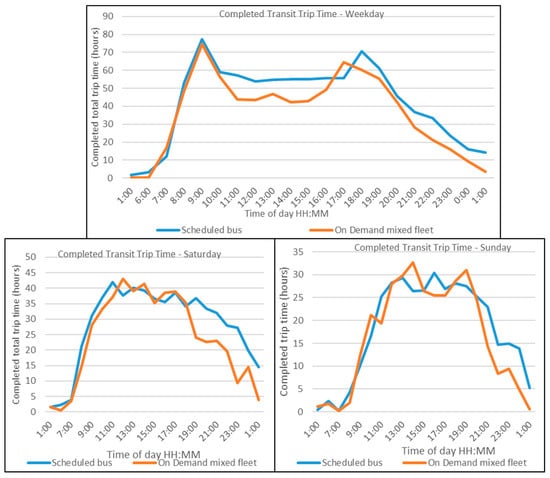
Figure 9.
Completed transit trip time.
- 4.
- Completed passenger and bus trip distances
Passenger kilometers traveled represent the overall distance for passengers, including walking to/from stops and on-bus travel. Trip distances are comparable in both scenarios due to shared routes. Table 7 displays similar distances as both services use common bus routes.

Table 7.
Total passenger and bus trip distances.
Conversely, completed bus distance sums all distance increments for vehicles reaching the final stop. On-demand scenarios have higher distances due to increased vehicle numbers.
6.4. Environmental Emissions (CO2, NO, and PM10)
Commuter’s analysis for CO2, NO, and PM10 is based on specified engine capacities for each transit vehicle type. Engine types encompass maximum speed, acceleration, braking rates, and emissions levels for various exhaust gases. Standard engine definitions in Commuter use UK Transport Research Laboratory (TRL) data detailing acceleration, braking, and exhaust emissions. Emission values are tabulated by speed and acceleration, with constant speed values from a TRL study [71].
The comparative evaluation considered CO2, NO, and PM10 emissions for completed journeys. Diesel buses emulated scheduled bus services (Melbourne’s current fleet), ensuring fair comparisons. Emission standards for diesel engines under 2 L (fleet 4), over 2 L (fleet 7), and others (fleet 12) were chosen for on-demand services. Table 8 illustrates significant emission reductions for demand-responsive buses.

Table 8.
Environmental emissions.
6.4.1. On-Time Performance (Waiting Times at Bus Stops)
On-time performance is measured using waiting times at bus stops, which includes two components (T1 and T2):
- T1 refers to the amount of time customers must wait before the first bus arrives. This time is calculated as the average duration between the time of passenger arrival at the stop and the arrival of the first bus for all passengers.
- T2 represents the average waiting duration from passenger arrival at the bus stop to their boarding time. If the customer manages to board the first bus service after arriving at the bus stop, then T1 and T2 are the same. If the first bus service is fully occupied and the passenger cannot board the bus and has to wait for the next service, T2 would capture that additional waiting time. This differentiation is crucial because while sometimes the first bus may arrive on time, it is either fully occupied or not all passengers are able to board, resulting in some passengers not catching the bus.
The model was run from 00:00 AM to 01:00 AM the next day and was broken into five parts, as shown in Table 9, to provide greater insight into the service quality. The results in Figure 10 show that on-demand services deliver lower waiting times for every time period considered (“early morning”, “morning peak”, “mid-day”, “evening peak”, and “late evening”) for both weekdays and weekends, except for the early morning time period on Sundays. This was due to the sparse Sunday demand, which resulted in approximately 5 min of waiting time.

Table 9.
Total waiting time.
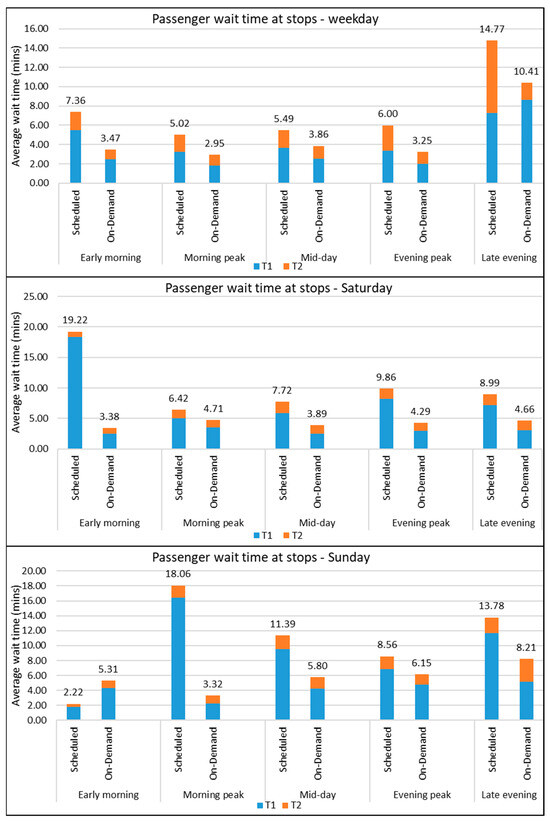
Figure 10.
Passenger wait time at stops.
The results in Table 9 show that the total waiting time for on-demand services in both morning and evening peaks on weekdays is at least 40% lower compared to scheduled services. The off-peak periods showed approximately a 30% reduction in waiting time for on-demand scenarios compared to scheduled services. Therefore, peak periods on weekdays seem to have experienced better benefits compared to mid-day and late evening time periods.
For an average Saturday, there was a high reduction in the early morning period waiting time (around 82%) for on-demand services. The reduction was around 50% during the later periods of the day. For an average Sunday, except for the early morning period, there was a substantial reduction in waiting times for passengers using the on-demand services.
It is important to note that the suggested on-demand services are yet to operate in Melbourne, thus lacking costing data for these proposals. Speculating on potential costs is unreliable without knowledge of operators’ commercial models. However, overseas experiments deploying similar systems reveal that on-demand services with smaller vehicles (mini-buses, vans, and cars) offer flexibility with direct, as-needed trips. Overseas studies also demonstrated that on-demand transport reduces low-capacity service frequency while maintaining comparable costs [84]. The same literature also shows that the economies of scale for high-capacity collective transit systems such as subways and tramways require significantly substantial initial investments. The average cost per trip in such systems reduces with increased passenger demand density. However, for on-demand transit services, the economies of scale are not significant, and interestingly, these on-demand services with fixed lines and variable stops only partially follow this decreasing pattern with respect to demand density. Compared to cases where fixed-schedule buses operate in low-demand areas, the average cost per trip using on-demand transport is lower than fixed-schedule buses. Beyond a specific demand limit, the total unit cost of flexible services and travel time starts to increase [85], indicating that on-demand transport is more cost-effective in areas that have low demands. In addition to the above, on-demand shared services with variable route layouts can result in increasing unit total cost with respect to demand due to the detour caused to service newly added users [86]. Research suggests more detours per vehicle should only be accommodated if there is a priority measure presented in the road network, such as express lanes or high-occupancy vehicle lanes, to ensure these services’ travel times are competitive compared to conventional private vehicles. The literature consulted on the cost issue concluded that the implementation of on-demand services with route flexibility has a direct influence on reducing the economies of scale of the entire transport network and constraining the reduction of average cost per user [85].
6.4.2. Economic Evaluation
On-demand services have several economic benefits, such as lower average cost per person, reduced environmental emissions, and shorter travel times. The economic evaluation tool within the Commuter agent-based software was used to develop detailed costing for each trip. This analysis is used to assess the benefit/cost ratio (BCR) of the proposed on-demand buses and compare their BCR to other public transport interventions. As shown in Table 10, the economic evaluation results indicate that the average cost per person is lower in the on-demand scenario compared to the base scenario (fixed scheduled bus services), which makes the case for on-demand buses even more compelling.

Table 10.
Economic evaluation—average cost per person.
It is crucial to highlight that cost data for the proposed on-demand services in Melbourne are unavailable due to their non-operation. Speculating on potential costs is not reliable without knowledge of operators’ commercial models. Hence, future research should investigate using smaller vehicles (mini-buses, vans, and cars) for flexible, direct trips. Additionally, implementing flexible on-demand services can impact economies of scale in the transport network.
Previous research indicated that on-demand services lowered low-capacity service frequency while maintaining similar costs [84]. This literature also revealed that large-scale investments are necessary for high-capacity systems such as subways and trams, with lower per-trip costs as demand density increases. However, on-demand services show less pronounced economies of scale. Remarkably, on-demand services with fixed lines and variable stops only partially conform to the decreasing cost pattern based on demand density.
Compared to cases where fixed-schedule buses operate in low-demand areas, the average cost per trip using on-demand buses was lower than fixed-schedule buses. Beyond a specific demand limit, the total unit cost of flexible services and travel time increased [85], indicating that on-demand buses were more cost-effective in areas with low demand.
In addition, on-demand shared services with variable route layouts can result in increasing unit total cost with respect to demand due to the detour caused to service newly added users [87]. Research suggests that more detours per vehicle should only be accommodated if a priority measure is presented in the road network, such as express lanes or high occupancy vehicle lanes, to ensure these services’ travel times are competitive compared to conventional private vehicles.
The literature consulted on the cost issues indicates that implementing on-demand services with route flexibility directly affects economies of scale in the transport network and can limit the reduction in average user costs [85].
Overall, operating costs are significant when assessing on-demand public transport feasibility. Our study and others show that on-demand buses are cost-effective, especially in low-demand zones. Incorporating economic evaluation tools and the broader literature, our study highlights on-demand services’ cost-reduction potential and network efficiency enhancement. However, in high-demand zones, factors such as density, detours, and travel time must be considered for cost-effectiveness.
7. Challenges
DRT emerges as a promising solution for overcoming challenges in traditional public transportation. DRT’s features include dynamism, self-sufficiency, cost-sharing, infrequency, and pre-planning. In a study by [88], three DRT variations are explored: single rider–single driver, single driver–multiple rider, and single rider–multiple driver setups. DRT-like systems aim to reduce vehicle miles and travel time and increase engagement [88].
One of the critical questions to arise is why DRT is not more widely implemented despite its potential, as indicated in this study. To address this issue, it is essential to delve into the challenges and barriers that have hindered the wider adoption of DRT services. The implementation of DRT services on a large scale faces numerous challenges, including operational, technical, financial, and regulatory barriers. These barriers vary depending on the context, location, and target population [41,89]. Research suggests that failure to consider these challenges during the planning and implementation stages has resulted in many unsuccessful attempts to introduce DRT services.
An illustrative example of on-demand public transport is BRIDJ, launched in Boston in 2014 [64]. It expanded to Washington, DC, and Kansas City, using real-time data and passenger input for optimal routes. Despite its efficiency, BRIDJ ceased operations in the US due to ridership, operational, awareness, and network challenges. Another example is Kutsuplus in Helsinki [90], which also ceased due to financial constraints. The service struggled to attract enough passengers to cover its operational costs, and the pricing model was not sustainable. Other trials that were shut down in multiple cities include Beeline in Singapore (in service from 2015 to 2020), Flexcar (USA), and Chariot in the USA and London (in service from 2014 to 2019), with several factors leading to the closure of these services. These included challenges in scaling up the initiatives, building commercially viable user densities, and financial difficulties. The systems also struggled to achieve profitability due to high operational costs, including vehicle maintenance and fleet management. Other reasons included network-specific issues, a lack of understanding of demand patterns, and challenges with route optimization and fleet scheduling. This is in addition to low ridership and lack of demand, which were the main causes of their failures. The services could not also generate enough interest and usage to make them financially viable. The lack of awareness and understanding among potential users and limited service hours and availability posed a significant barrier to their success [61,62,63,64,65,66].
These examples highlight several common reasons for the failure of DRT services. Financial challenges, such as high operational costs and unsustainable pricing models, often play a significant role. DRT requires a significant investment in technology and infrastructure to provide flexible and on-demand services [64,65,66]. Additionally, low ridership and lack of demand can lead to the discontinuation of DRT services. Lack of awareness, preference, and understanding among potential users also hinders the adoption and success of these services. Many potential users may not be aware of DRT services or may prefer the convenience of private vehicles or ride-hailing services [61,62,63].
The integration of DRT faces significant regulatory hurdles as the current rules may not be adaptable to the dynamic nature of DRT services. For instance, obtaining regulatory exceptions from fixed routes and schedules might be necessary for DRT operations. A study by [91] emphasizes the need to revamp the regulatory framework to support the growth of DRT services. Transport regulations must evolve to accommodate the emerging shared mobility trends driven by AI and digital innovations. These technologies are creating an intermediary layer between transport modes and users through data integration, thus posing new challenges to transport policies. To facilitate broader DRT implementation, policymakers must establish comprehensive regulatory frameworks that embrace information technology across various transport modes [92].
This necessitates a user-focused regulatory framework that encourages innovation while ensuring safety, privacy, fairness, and sustainability [92]. In the short term, mobility-as-a-service allows public agencies to enhance their offerings. Long-term strategies may involve redefining roles and collaborating with private providers [93]. Strategies for DRT adoption include partnerships, incentives, and marketing [88]. User preferences are key [24]. Partnerships attract investment, while incentives and streamlined licenses spur growth. Targeted marketing boosts awareness and adoption.
Yet, these challenges pose difficulties in achieving these objectives. Existing transport operators pose a significant barrier due to their reluctance to accept DRT, as it might threaten their market share. The lack of cooperation between existing operators and DRT providers has impeded integrated transport system development [94]. Other challenges include road safety and liability concerns, bootstrapping issues in building a user base for shared rides, and the complexity of predicting user travel patterns. However, if there is a large user base for a particular DRT service, there may be more opportunities for users to find others to share rides [95].
It is crucial to acknowledge that these trials often did not adequately address these issues. This research seeks to enhance decision-making by identifying shortcomings and overcoming barriers. Learning from past DRT failures, potential interventions could include leveraging deep learning theories and advanced mathematical models to strike a balance between operator profitability and user satisfaction [13,14]. Future prediction of passenger demand, efficient vehicle allocation, and optimal route selection could improve passenger satisfaction and ridership [96,97,98,99]. Predicting traffic using real-time big data analysis remains a difficulty, particularly due to the unpredictable nature of human behavior. This underscores the need for further research in predicting user travel patterns.
To overcome the barriers described above, public–private partnerships, regulatory incentives, and targeted marketing campaigns that take into account user needs and preferences can be employed to promote the development and adoption of on-demand transport services.
8. Conclusions
This study employs agent-based simulation to assess on-demand transit in an inner-city Melbourne area using real passenger demand data. Performance is compared against existing scheduled buses, using validated smart card data for trip origins and destinations. Results highlight low occupancy (under 20%) and underperformance on many fixed routes. On-demand scenarios were modeled, revealing a trade-off between passenger experience and operator/public benefits. Reducing service quality for cost savings led to unfavorable customer outcomes.
The overall results for on-demand scenarios compared to scheduled buses are summarized as follows:
- On-demand services reduced average passenger trip times by 30% compared to fixed schedule services, resulting in improved quality of service and passenger experience.
- On-demand services improved service efficiency by increasing vehicle occupancy rates from 8% for scheduled bus services to over 50% for on-demand buses.
- On-demand services improved system efficiency by reducing total passenger trip times by 50% compared to fixed-schedule bus services.
- There was no significant difference between on-demand and fixed-schedule trip completion rates, bus trip times, or distances.
- On-demand services resulted in a drastic reduction in the total environmental emissions and emissions per person trip values compared to fixed-schedule bus scenarios.
The case study used in this research includes lines that are underperforming, which would make flexible services have a more pronounced positive impact under low-demand scenarios. The conditions in the base case scenario using fixed schedules will impact the degree of benefits to be realized using flexible services. An on-demand transport system is more efficient with smaller vehicles, as larger vehicles lead to longer waiting and travel times for passengers. However, due to a lack of real-world data on different base load factors, it would be challenging to draw meaningful insights into when flexible public transport services should be provided in general. An alternative approach to considering the conditions under which scheduled bus services are not cost-effective would be to consider the average achievable vehicle occupancy (utilization rate of 50%) that was achieved in the case study as the defining threshold. If the line vehicle occupancy and utilization rate is less than this threshold, then on-demand services are more beneficial. However, this research acknowledges that more data are necessary to evaluate different lines with variable load factors for future research. Such analysis would provide other insights useful for the implementation of flexible public transport services, including the selection of appropriate vehicle sizes. In addition, the results from this research suggest that a hybrid system of fixed and flexible services could be a viable solution for regions with more variable demand levels.
This work introduces a data-driven simulation method using smart card data for testing on-demand public transportation and establishing key impact assessment indicators. The findings hold immediate policy relevance for policymakers and regulators, aiding decision-making regarding the benefits, cost savings, and enhanced customer experience of demand-responsive services.
In order to extend the benefits of on-demand transport to other cities, several conditions must be considered. These services are particularly effective in areas with variable passenger demand, providing a responsive alternative to under-performing fixed-scheduled transport. They also offer significant advantages in densely populated areas with high traffic congestion, improving accessibility and reducing pressure on traditional bus routes. Successful implementation requires seamless integration with existing transport systems, including smart card fare systems and connections to other transport modes. While on-demand transport may incur higher operational costs, it can be cost-effective by minimizing the need for large, infrequent buses through efficient scheduling and route optimization. Cities should also consider initiating pilot programs to test these services, allowing for adjustments based on demand patterns and infrastructure specific to the study area. By meeting these conditions, other cities can influence on-demand transport to enhance public transport efficiency and service quality adapted to their specific urban contexts.
For future research, optimizing service schedules and capacities could enhance commercial viability and satisfaction by reaching target vehicle occupancy rates and reducing wait times. Additionally, conducting preference surveys to understand user characteristics and preferences will enhance service targeting. Future work could explore integrating 3D simulation tools such as CARLA with traditional microscopic simulators. CARLA’s high-fidelity capabilities for autonomous vehicle testing could enhance transport simulations, particularly in scenarios involving emerging mobility technologies [100,101]. Lastly, developing AI-driven predictive demand models remains crucial for accurate short-term passenger demand forecasts, ensuring successful operational planning.
Supplementary Materials
The following supporting information can be downloaded at: https://www.mdpi.com/article/10.3390/su16198477/s1.
Author Contributions
Conceptualization, S.L. and H.D.; Methodology, S.L.; Software, G.D.; Formal analysis, S.L.; Writing—original draft, S.L. and R.A.; Writing—review & editing, H.D. and G.D.; Supervision, H.D. All authors have read and agreed to the published version of the manuscript.
Funding
This research received no external funding.
Institutional Review Board Statement
Not applicable.
Informed Consent Statement
Not applicable.
Data Availability Statement
The data presented in this study are available on request from the corresponding author.
Conflicts of Interest
Author Gordon Duncan was employed by the company Azalient. The remaining authors declare that the research was conducted in the absence of any commercial or financial relationships that could be construed as a potential conflict of interest.
References
- Chandakas, E. On demand forecasting of demand-responsive paratransit services with prior reservations. Transp. Res. Part C Emerg. Technol. 2020, 120, 102817. [Google Scholar] [CrossRef]
- Joël Hazan, N.L.; Augustin, K. Wegscheider, and Benjamin Fassenot. On-Demand Transit Can Unlock Urban Mobility. Available online: https://www.bcg.com/en-au/publications/2019/on-demand-transit-can-unlock-urban-mobility.aspx (accessed on 20 February 2020).
- Dia, H.; Harney, D.; Boyle, A. Dynamics of drivers’ route choice decisions under advanced traveller information systems. Road Transp. Res. 2001, 10, 3. [Google Scholar]
- Goodwill, J.A.; Carapella, H. Creative Ways to Manage Paratransit Costs; National Center for Transit Research (US): Tampa, FL, USA, 2008. [Google Scholar]
- Linda, S. Can public transport compete with the private car? Iatss Res. 2003, 27, 27–35. [Google Scholar]
- Mageean, J.; Nelson, J.D. The evaluation of demand responsive transport services in Europe. J. Transp. Geogr. 2003, 11, 255–270. [Google Scholar] [CrossRef]
- Gschwender, A. A Comparative Analysis of the Public Transport Systems of Santiago de Chile, London, Berlin and Madrid: What Can Santiago Learn from the European Experiences? Citeseer: Princeton, NJ, USA, 2007. [Google Scholar]
- London-Travel-Watch. Clearing the Way for London’s Buses. Available online: https://www.londontravelwatch.org.uk/blog/clearing-the-way-for-londons-buses/ (accessed on 18 September 2024).
- Lam, S.H.; Toan, T.D. Land transport policy and public transport in Singapore. Transportation 2006, 33, 171–188. [Google Scholar] [CrossRef]
- Lindau, L.A.; Hidalgo, D.; Facchini, D. Curitiba, the cradle of bus rapid transit. Built Environ. 2010, 36, 274–282. [Google Scholar] [CrossRef]
- Wan, D.; Kamga, C.; Hao, W.; Sugiura, A.; Beaton, E.B. Customer satisfaction with bus rapid transit: A study of New York City select bus service applying structural equation modeling. Public Transp. 2016, 8, 497–520. [Google Scholar] [CrossRef]
- Liyanage, S.; Dia, H. An agent-based simulation approach for evaluating the performance of on-demand bus services. Sustainability 2020, 12, 4117. [Google Scholar] [CrossRef]
- Atasoy, B.; Ikeda, T.; Ben-Akiva, M.E. Optimizing a flexible mobility on demand system. Transp. Res. Rec. 2015, 2563, 76–85. [Google Scholar] [CrossRef]
- Atasoy, B.; Ikeda, T.; Song, X.; Ben-Akiva, M.E. The concept and impact analysis of a flexible mobility on demand system. Transp. Res. Part C Emerg. Technol. 2015, 56, 373–392. [Google Scholar] [CrossRef]
- Mohamed, M.J.; Rye, T.; Fonzone, A. Operational and policy implications of ridesourcing services: A case of Uber in London, UK. Case Stud. Transp. Policy 2019, 7, 823–836. [Google Scholar] [CrossRef]
- Shamshiripour, A.; Rahimi, E.; Shabanpour, R.; Mohammadian, A.K. Dynamics of travelers’ modality style in the presence of mobility-on-demand services. Transp. Res. Part C Emerg. Technol. 2020, 117, 102668. [Google Scholar] [CrossRef]
- Tsoukanelis, A.; Genitsaris, E.; Nalmpantis, D.; Naniopoulos, A. Conjoint analysis for the optimization of a potential flexible transport service (FTS) in the region of Zagori, Greece. In Proceedings of the 4th Conference on Sustainable Urban Mobility (CSUM2018), Skiathos Island, Greece, 24–25 May 2018; pp. 478–486. [Google Scholar]
- Alonso-González, M.J.; Liu, T.; Cats, O.; Van Oort, N.; Hoogendoorn, S. The potential of demand-responsive transport as a complement to public transport: An assessment framework and an empirical evaluation. Transp. Res. Rec. 2018, 2672, 879–889. [Google Scholar] [CrossRef]
- Alonso-Mora, J.; Samaranayake, S.; Wallar, A.; Frazzoli, E.; Rus, D. On-demand high-capacity ride-sharing via dynamic trip-vehicle assignment. Proc. Natl. Acad. Sci. USA 2017, 114, 462–467. [Google Scholar] [CrossRef] [PubMed]
- Attard, M.; Camilleri, M.P.J.; Muscat, A. The technology behind a shared demand responsive transport system for a university campus. Res. Transp. Bus. Manag. 2020, 36, 100463. [Google Scholar] [CrossRef]
- Coutinho, F.M.; van Oort, N.; Christoforou, Z.; Alonso-González, M.J.; Cats, O.; Hoogendoorn, S. Impacts of replacing a fixed public transport line by a demand responsive transport system: Case study of a rural area in Amsterdam. Res. Transp. Econ. 2020, 83, 100910. [Google Scholar] [CrossRef]
- Chan, N.D.; Shaheen, S.A. Ridesharing in North America: Past, present, and future. Transp. Rev. 2012, 32, 93–112. [Google Scholar] [CrossRef]
- Liyanage, S.; Dia, H.; Abduljabbar, R.; Bagloee, S.A. Flexible Mobility On-Demand: An Environmental Scan. Sustainability 2019, 11, 1262. [Google Scholar] [CrossRef]
- Shaheen, S.; Cohen, A. Mobility on Demand (MOD) and Mobility as a Service (MaaS): Early Understanding of Shared Mobility Impacts and Public Transit Partnerships; Elsevier: Amsterdam, The Netherlands, 2020; pp. 37–59. [Google Scholar]
- Enoch, M.; Potter, S.; Parkhurst, G.; Smith, M. INTERMODE: Innovations in demand responsive transport: Final report. In Social Research in Transport (SORT) Clearinghouse; Department for Transport: London, UK, 2022. [Google Scholar]
- Frei, C.; Hyland, M.; Mahmassani, H.S. Flexing service schedules: Assessing the potential for demand-adaptive hybrid transit via a stated preference approach. Transp. Res. Part C Emerg. Technol. 2017, 76, 71–89. [Google Scholar] [CrossRef]
- Hu, X.; Zhao, L.; Wang, W. Impact of perceptions of bus service performance on mode choice preference. Adv. Mech. Eng. 2015, 7, 1687814015573826. [Google Scholar] [CrossRef]
- Arentze, T.A.; Molin, E.J.E. Travelers’ preferences in multimodal networks: Design and results of a comprehensive series of choice experiments. Transp. Res. Part A Policy Pract. 2013, 58, 15–28. [Google Scholar] [CrossRef]
- Wardman, M. Public transport values of time. Transp. Policy 2004, 11, 363–377. [Google Scholar] [CrossRef]
- Ryley, T.; Stanley, P.; Zanni, A.; Quddus, M.; Enoch, M. An examination of the potential use of demand responsive transport services. In Proceedings of the Transportation Research Board 93rd Annual Meeting, Washington, DC, USA, 12–16 January 2014. [Google Scholar]
- Giuffrida, N.; Le Pira, M.; Inturri, G.; Ignaccolo, M. Addressing the public transport ridership/coverage dilemma in small cities: A spatial approach. Case Stud. Transp. Policy 2021, 9, 12–21. [Google Scholar] [CrossRef]
- Diana, M.; Dessouky, M.M. A new regret insertion heuristic for solving large-scale dial-a-ride problems with time windows. Transp. Res. Part B Methodol. 2004, 38, 539–557. [Google Scholar] [CrossRef]
- Quadrifoglio, L.; Dessouky, M.M.; Palmer, K. An insertion heuristic for scheduling mobility allowance shuttle transit (MAST) services. J. Sched. 2007, 10, 25–40. [Google Scholar] [CrossRef]
- Quadrifoglio, L.; Li, X. A methodology to derive the critical demand density for designing and operating feeder transit services. Transp. Res. Part B Methodol. 2009, 43, 922–935. [Google Scholar] [CrossRef]
- Chandra, S.; Quadrifoglio, L. A model for estimating the optimal cycle length of demand responsive feeder transit services. Transp. Res. Part B Methodol. 2013, 51, 1–16. [Google Scholar] [CrossRef]
- Diana, M.; Dessouky, M.M.; Xia, N. A model for the fleet sizing of demand responsive transportation services with time windows. Transp. Res. Part B Methodol. 2006, 40, 651–666. [Google Scholar] [CrossRef]
- Bruni, M.E.; Guerriero, F.; Beraldi, P. Designing robust routes for demand-responsive transport systems. Transp. Res. Part E Logist. Transp. Rev. 2014, 70, 1–16. [Google Scholar] [CrossRef]
- Tang, Q.; Du, P. Study on accessibility of feeder lines with different geometric shapes. J. Adv. Transp. 2020, 2020, 4040252. [Google Scholar] [CrossRef]
- Zheng, Y.; Li, W.; Qiu, F. A methodology for choosing between route deviation and point deviation policies for flexible transit services. J. Adv. Transp. 2018, 2018, 6292410. [Google Scholar] [CrossRef]
- Wang, Z.; Yu, J.; Hao, W.; Chen, T.; Wang, Y. Designing high-freedom responsive feeder transit system with multitype vehicles. J. Adv. Transp. 2020, 2020, 8365194. [Google Scholar] [CrossRef]
- Huang, D.; Tong, W.; Wang, L.; Yang, X. An analytical model for the many-to-one demand responsive transit systems. Sustainability 2020, 12, 298. [Google Scholar] [CrossRef]
- Calabrò, G.; Le Pira, M.; Giuffrida, N.; Inturri, G.; Ignaccolo, M.; Correia, G.H.d.A. Fixed-Route vs. Demand-Responsive Transport Feeder Services: An Exploratory Study Using an Agent-Based Model. J. Adv. Transp. 2022, 2022, 8382754. [Google Scholar] [CrossRef]
- Dia, H.; Cottman, N. Evaluation of Arterial Incident Management Impacts Using Traffic Simulation, 3rd ed.; IET: London, UK, 2006; Volume 153, pp. 242–252. [Google Scholar]
- Narayan, J.; Cats, O.; Oort, N.; Hoogendoorn, S. On the scalability of private and pooled on-demand services for urban mobility in Amsterdam. Transp. Plan. Technol. 2021, 45, 2–18. [Google Scholar] [CrossRef]
- Edwards, D.; Elangovan, A.K.; Watkins, K. Reaching low-density urban areas with the network-inspired transportation system. In Proceedings of the 2012 15th International IEEE Conference on Intelligent Transportation Systems, Anchorage, AK, USA, 16–19 September 2012; pp. 826–831. [Google Scholar]
- Inturri, G.; Giuffrida, N.; Ignaccolo, M.; Le Pira, M.; Pluchino, A.; Rapisarda, A. Testing demand responsive shared transport services via agent-based simulations. In New Trends in Emerging Complex Real Life Problems; Springer: Berlin/Heidelberg, Germany, 2018; pp. 313–320. [Google Scholar]
- Scheltes, A.; de Almeida Correia, G.H. Exploring the use of automated vehicles as last mile connection of train trips through an agent-based simulation model: An application to Delft, Netherlands. Int. J. Transp. Sci. Technol. 2017, 6, 28–41. [Google Scholar] [CrossRef]
- Araldo, A.; Di Maria, A.; Di Stefano, A.; Morana, G. On the Importance of demand Consolidation in Mobility on Demand. In Proceedings of the 2019 IEEE/ACM 23rd International Symposium on Distributed Simulation and Real Time Applications (DS-RT), Cosenza, Italy, 7–9 October 2019; pp. 1–8. [Google Scholar]
- Oh, S.; Seshadri, R.; Le, D.-T.; Zegras, P.C.; Ben-Akiva, M.E. Evaluating automated demand responsive transit using microsimulation. IEEE Access 2020, 8, 82551–82561. [Google Scholar] [CrossRef]
- Fielbaum, A.; Bai, X.; Alonso-Mora, J. On-demand ridesharing with optimized pick-up and drop-off walking locations. Transp. Res. Part C Emerg. Technol. 2021, 126, 103061. [Google Scholar] [CrossRef]
- Giuffrida, N.; Le Pira, M.; Inturri, G.; Ignaccolo, M.; Calabrò, G.; Cuius, B.; D’Angelo, R.; Pluchino, A. On-demand flexible transit in fast-growing cities: The case of Dubai. Sustainability 2020, 12, 4455. [Google Scholar] [CrossRef]
- Inturri, G.; Giuffrida, N.; Ignaccolo, M.; Le Pira, M.; Pluchino, A.; Rapisarda, A.; D’Angelo, R. Taxi vs. demand responsive shared transport systems: An agent-based simulation approach. Transp. Policy 2021, 103, 116–126. [Google Scholar] [CrossRef]
- Inturri, G.; Le Pira, M.; Giuffrida, N.; Ignaccolo, M.; Pluchino, A.; Rapisarda, A.; D’Angelo, R. Multi-agent simulation for planning and designing new shared mobility services. Res. Transp. Econ. 2019, 73, 34–44. [Google Scholar] [CrossRef]
- Bennett, T. Keoride: The Future of on-Demand Transport? Available online: https://www.goget.com.au/blog/keoride-the-future-of-on-demand-transport/ (accessed on 26 August 2024).
- Downer, K. On Demand Transport: Co-designing Tailored Mobility Solutions. 2018. Available online: https://www.keolisdowner.com.au/a-community-winner-keoride-on-demand-public-transport-service-in-mount-barker-nairne-and-littlehampton-extended-till-june-2022/ (accessed on 26 August 2024).
- Ipart. Opal Fares 2020–2024: On-Demand Bus Fares; Ipart: Sydney, NSW, Australia, 2020. [Google Scholar]
- Transport-for-NSW. Keoride Case Study; Transport-for-NSW: Sydney, NSW, Australia, 2021. [Google Scholar]
- Pettersson, F. An International Review of Experiences from on-Demand Public Transport Services. K2 Working Paper; Lund University: Lund, Sweden, 2019. [Google Scholar]
- Sharmeen, F.; Meurs, H. The Governance of Demand-Responsive Transit Systems—A Multi-Level Perspective; Springer: Berlin/Heidelberg, Germany, 2019; pp. 207–227. [Google Scholar]
- EU-Japan-Centre. On-Demand Public Transport|Shotl X Odakyu Electric Railway. Available online: https://www.eu-japan.eu/publications/demand-public-transport-shotl-x-odakyu-electric-railway (accessed on 12 June 2024).
- Kaufman, R. Chasing the Next Uber—Next City: Which City Will Be the First to Crack on-Demand Mobility? Available online: https://nextcity.org/features/view/helsinki-kutsuplus-on-demand-transportation-mobility-next-uber (accessed on 17 October 2018).
- Rissanen, K. Kutsuplus–Final Report; HSL: Helsinki, Finland, 2016. [Google Scholar]
- Sulopuisto, O. Why Helsinki’s Innovative On-Demand Bus Service Failed. Available online: https://www.worldsmartcity.org/why-helsinkis-innovative/ (accessed on 10 July 2016).
- Bridj. Demand Responsive Transport Solutions. Available online: https://www.bridj.com/ (accessed on 30 December 2018).
- Gray, L. What Killed Kutsuplus? 3 Takeaways for Cities Pursuing Mobility-On-Demand. Shared-Use Mobility Centre. 2016. Available online: https://sharedusemobilitycenter.org/killed-kutsuplus-3-takeaways-cities-pursing-mobility-demand/ (accessed on 26 August 2024).
- Hawkins, A.J. Ford’s On-demand Bus Service Chariot Is Going Out of Business. The Verge, 17 January 2019. [Google Scholar]
- Hawas, Y.E.; Khan, M.; Basu, N. Evaluating and enhancing the operational performance of public bus systems using GIS-based data envelopment analysis. J. Public Transp. 2012, 15, 2. [Google Scholar] [CrossRef][Green Version]
- Kathuria, A.; Parida, M.; Sekhar, C.R. A review of service reliability measures for public transportation systems. Int. J. Intell. Transp. Syst. Res. 2020, 18, 243–255. [Google Scholar] [CrossRef]
- Zhou, Y.; Yao, L.; Chen, Y.; Gong, Y.; Lai, J. Bus arrival time calculation model based on smart card data. Transp. Res. Part C Emerg. Technol. 2017, 74, 81–96. [Google Scholar] [CrossRef]
- Autodesk. Mobility Simulator. Available online: https://help.autodesk.com/view/INFMDR/ENU/?guid=GUID-111318F7-0F27-4194-B933-07935B9A9640 (accessed on 26 August 2024).
- Azalient. Commuter. Available online: https://forums.autodesk.com/autodesk/attachments/autodesk/509/7483/1/CommuterManual_036.pdf (accessed on 26 August 2024).
- Duncan, G. From microsimulation to nanosimulation: Visualizing person trips over multiple modes of transport. Transp. Res. Rec. 2010, 2175, 130–137. [Google Scholar] [CrossRef]
- World-Population-Review. 2021. Available online: https://worldpopulationreview.com/ (accessed on 26 August 2024).
- PTV. Transport Data. Available online: https://www.vic.gov.au/transport-data (accessed on 18 September 2024).
- PTV. 2018–2019 Annual Report. Available online: https://www.ptv.vic.gov.au/assets/PTV-default-site/footer/data-and-reporting/annual-report/PTVH4043-Annual_Report_2019-A4-v1_ONLINE.pdf (accessed on 18 September 2024).
- PTV. Public Transport Victoria. Available online: https://www.ptv.vic.gov.au/timetables (accessed on 26 August 2024).
- Javanshour, F.; Dia, H.; Duncan, G. Exploring the performance of autonomous mobility on-demand systems under demand uncertainty. Transp. A Transp. Sci. 2019, 15, 698–721. [Google Scholar] [CrossRef]
- Dia, H. The real-time city: Unlocking the potential of smart mobility. In Proceedings of the 38th Australasian Transport Research Forum (ATRF 2016), Melbourne, Australia, 16–18 November 2016; pp. 16–18. [Google Scholar]
- Smit, R.; Dia, H.; Morawska, L. Road traffic emission and fuel consumption modelling: Trends, new developments and future challenges. In Traffic Related Air Pollution and Internal Combustion Engines; Nova Science Publishers: Hauppauge, NY, USA, 2009. [Google Scholar]
- Liyanage, S.; Pravinvongvuth, S. Obtaining the optimum block length of the Chet network: An at-grade transportation network without signalized intersections, roundabouts, or stop signs. Engineer 2018, L, 37–46. [Google Scholar] [CrossRef]
- Asensio, J.; Matas, A. Commuters’ valuation of travel time variability. Transp. Res. Part E Logist. Transp. Rev. 2008, 44, 1074–1085. [Google Scholar] [CrossRef]
- VISTA. Victorian Integrated Survey of Travel and Activity. Victoria State Government, Department of Transport, Australia. Available online: https://discover.data.vic.gov.au/dataset/victorian-integrated-survey-of-travel-and-activity (accessed on 14 December 2019).
- Public Transport Users Association. Myth: Replacing ‘Underperforming’ Buses with Microtransit Will Save Money and Be Better for Passengers; Public Transport Users Association: Melbourne, Australia, 2019. [Google Scholar]
- Barrett, S.; Santha, N.; Khanna, A. On-demand Public Transport: Key Learnings from Global Pilots. In LEK Special Report; L.E.K. Consulting: Boston, MA, USA, 2019. [Google Scholar]
- Estrada, M.; Salanova, J.M.; Medina-Tapia, M.; Robusté, F. Operational cost and user performance analysis of on-demand bus and taxi systems. Transp. Lett. 2021, 13, 229–242. [Google Scholar] [CrossRef]
- Wang, X.; Dessouky, M.; Ordonez, F. A pickup and delivery problem for ridesharing considering congestion. Transp. Lett. 2016, 8, 259–269. [Google Scholar] [CrossRef]
- Wang, R.; Fan, S.; Work, D.B. Efficient multiple model particle filtering for joint traffic state estimation and incident detection. Transp. Res. Part C Emerg. Technol. 2016, 71, 521–537. [Google Scholar] [CrossRef]
- Agatz, N.; Erera, A.; Savelsbergh, M.; Wang, X. Optimization for dynamic ride-sharing: A review. Eur. J. Oper. Res. 2012, 223, 295–303. [Google Scholar] [CrossRef]
- Ceder, A.; Hassold, S.; Dunlop, C.; Chen, I. Improving urban public transport service using new timetabling strategies with different vehicle sizes. Int. J. Urban Sci. 2013, 17, 239–258. [Google Scholar] [CrossRef]
- Citylab. Why Helsinki’s On-Demand Bus Service Failed. Available online: https://www.citylab.com/transportation/2016/03/helsinki-on-demand-bus-service-kutsuplus/472545/ (accessed on 27 December 2018).
- van den Berg, V.A.; Verhoef, E.T. Autonomous cars and dynamic bottleneck congestion: The effects on capacity, value of time and preference heterogeneity. Transp. Res. Part B Methodol. 2016, 94, 43–60. [Google Scholar] [CrossRef]
- Finger, M. Mobility-as-a-Services: From the Helsinki experience to a European model? Eur. Transp. Regul. Obs. 2015, 1, 1–13. [Google Scholar]
- Center for Automotive Research. The Impact of New Mobility Services on the Automotive Industry. Available online: http://www.cargroup.org/?module=Publications&event=View&pubID=138 (accessed on 2 August 2016).
- Forum, I.T. Urban Mobility System Upgrade: How Shared Self-Driving Cars Could Change City Traffic. Available online: https://www.itf-oecd.org/sites/default/files/docs/15cpb_self-drivingcars.pdf (accessed on 10 September 2015).
- Cici, B.; Markopoulou, A.; Frias-Martinez, E.; Laoutaris, N. Assessing the potential of ride-sharing using mobile and social data: A tale of four cities. In Proceedings of the 2014 ACM International Joint Conference on Pervasive and Ubiquitous Computing, Seattle, WA, USA, 13–17 September 2014; pp. 201–211. [Google Scholar]
- Liyanage, S.; Abduljabbar, R.; Dia, H.; Tsai, P.-W. AI-based neural network models for bus passenger demand forecasting using smart card data. J. Urban. Manag. 2022, 11, 365–380. [Google Scholar] [CrossRef]
- Liyanage, S.P. Modelling the Impacts of On-Demand Public Transport. Ph.D. Thesis, Swinburne University of Technology, Melbourne, Australia, 2022. [Google Scholar]
- Lv, Y.; Duan, Y.; Kang, W.; Li, Z.; Wang, F.-Y. Traffic flow prediction with big data: A deep learning approach. IEEE Trans. Intell. Transp. Syst. 2014, 16, 865–873. [Google Scholar] [CrossRef]
- Liyanage, S.; Dia, H.; Abduljabbar, R.; Tsai, P.-W. Neural network approaches for forecasting short-term on-road public transport passenger demands. In Handbook on Artificial Intelligence and Transport; Edward Elgar Publishing: Cheltenham, UK, 2023; pp. 176–220. [Google Scholar]
- Dosovitskiy, A.; Ros, G.; Codevilla, F.; Lopez, A.; Koltun, V. CARLA: An open urban driving simulator. In Proceedings of the Conference on Robot Learning, Mountain View, CA, USA, 13–15 November 2017; pp. 1–16. [Google Scholar]
- Xiang, Y.; Wang, S.; Su, T.; Li, J.; Mao, S.S.; Geimer, M. KIT bus: A shuttle model for CARLA simulator. In Proceedings of the 2021 IEEE Industrial Electronics and Applications Conference (IEACon), Penang, Malaysia, 22–23 November 2021; pp. 7–12. [Google Scholar]
Disclaimer/Publisher’s Note: The statements, opinions and data contained in all publications are solely those of the individual author(s) and contributor(s) and not of MDPI and/or the editor(s). MDPI and/or the editor(s) disclaim responsibility for any injury to people or property resulting from any ideas, methods, instructions or products referred to in the content. |
© 2024 by the authors. Licensee MDPI, Basel, Switzerland. This article is an open access article distributed under the terms and conditions of the Creative Commons Attribution (CC BY) license (https://creativecommons.org/licenses/by/4.0/).

